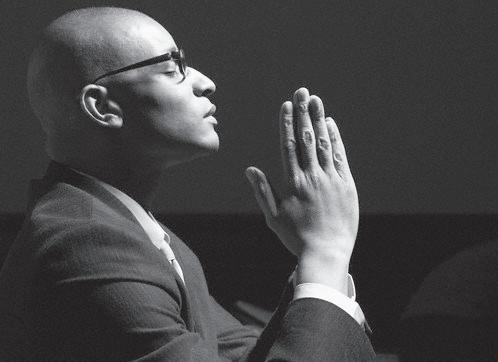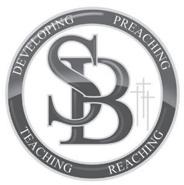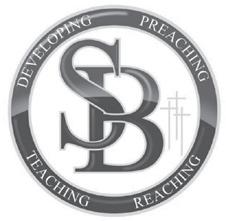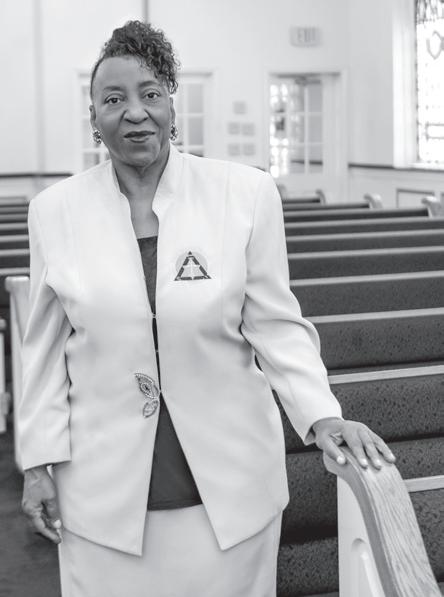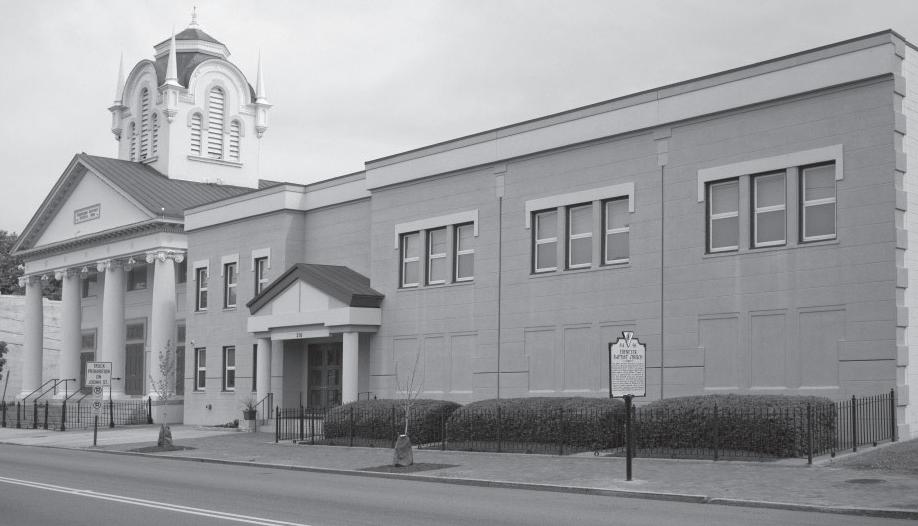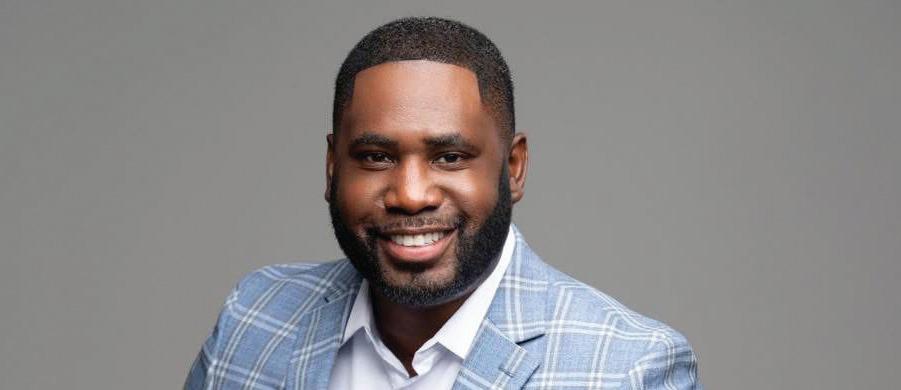




By George Copeland Jr.
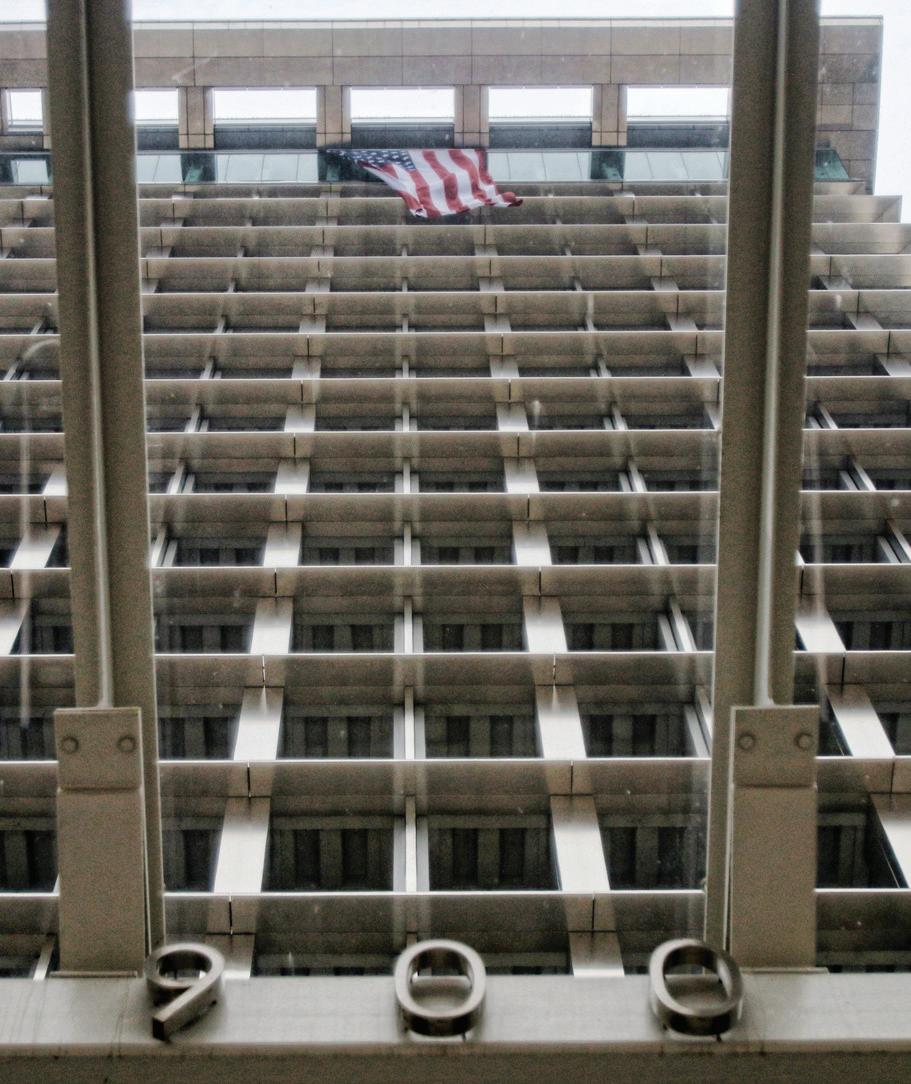
The City of Richmond filled several top leadership roles last week, with new appointments made in government operations, election oversight and gun violence prevention. On Monday, Richmond City Council approved Odie Donald II as the city’s new Chief Administrative Officer. Seven councilors voted in favor of confirming Mayor Danny Avula’s nominee. Donald will begin his duties Wednesday, July 9, succeeding interim CAO Sabrina Joy-Hogg and acting CAO Sharon Ebert.
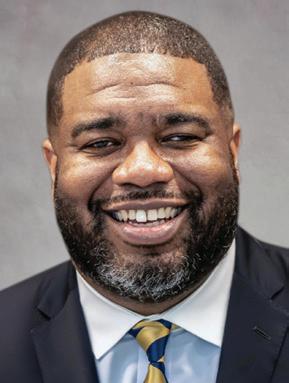
During the discussion, some concerns arose about the speed of the selection process. Third District Councilor Kenya Gibson abstained from voting. However, most council members expressed enthusiasm about Donald’s qualifications and the importance of filling this key role.
Donald currently serves as chief of staff to Atlanta Mayor Andre Dickens, and will bring almost 20 years of experience in government and organizational operations throughout Georgia.
“I’m honored by the Council’s confirmation, and deeply grateful to Mayor Avula for the opportunity to serve,” Donald said in a statement released after the vote. “There’s important work ahead, and I’m looking forward to partnering with the Mayor, Council and approximately 4,000 dedicated employees to get the
Please turn to A4
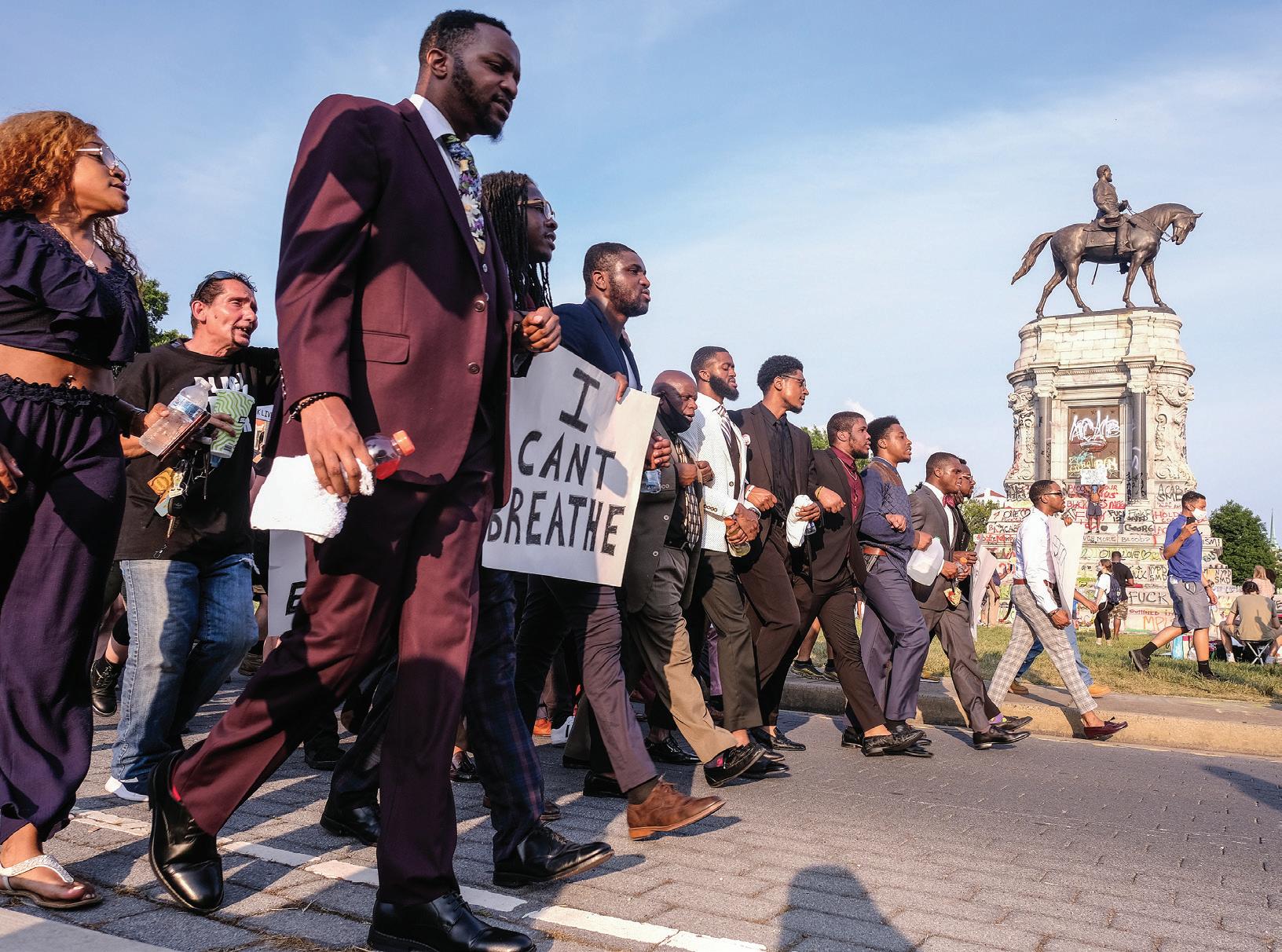

‘(re)Framing Protest (Now)’ exhibition comes to Branch Museum
By George Copeland Jr.
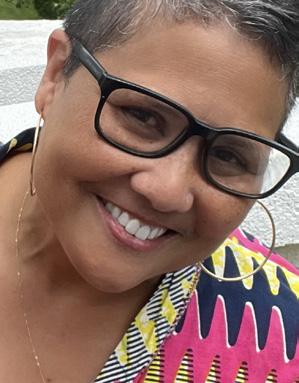
Five years after Richmond’s streets filled with protesters seeking justice following George Floyd’s murder, photos of that historic moment are returning to public view. The Branch Museum of Design presents “(re)Framing Protest (Now): Design + Hope” on June 19, showcasing images by photojournalists Regina H. Boone and Sandra Sellars that reveal community solidarity often overshadowed by portrayals of violence.
While mainstream coverage of the 65 days
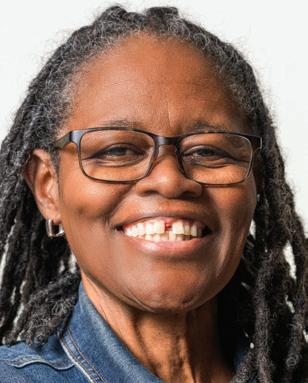
of global protests focused on clashes and destruction, Boone and Sellars captured something different: Richmond residents uniting peacefully and artistically for justice.
“We were both struck by the community of people that formed there,” Sellars said. “There was calmness there, there was a sense of community there, there was a sense of peace there.”
The original 2022 exhibition drew new audi-
Please turn to A4
By Jamie Stengle The Associated Press
The origin of the Juneteenth celebrations marking the end of slavery in the U.S. goes back to an order issued as Union troops arrived in Texas at the end of the Civil War. It declared that all enslaved people in the state were free and had “absolute equality.”
Word quickly spread of General Order No. 3 — issued on June 19, 1865, when U.S. Maj. Gen. Gordon Granger landed in the South Texas port city of Galveston — as troops posted handbills and newspapers published them.
The Dallas Historical Society will put one of those original handbills on display at the Hall of State in Fair Park starting June 19.
George Copeland Jr.
Juneteenth became a federal holiday in the U.S. in 2021 but has been celebrated in Texas since 1866. As time passed, communities in other states also started to mark the day.
“There’d be barbecue and celebrations,” said Portia D. Hopkins, the historian for Rice University in Houston. “It was really an effort for people to say: Look at how far we’ve come. Look at what we’ve been able to endure as a community.”
Progression of freedom
On Jan. 1, 1863, nearly two years into the Civil War, President Abraham Lincoln issued the Emancipation Proclamation, which declared the freedom of “all persons held as slaves” in the still rebellious states
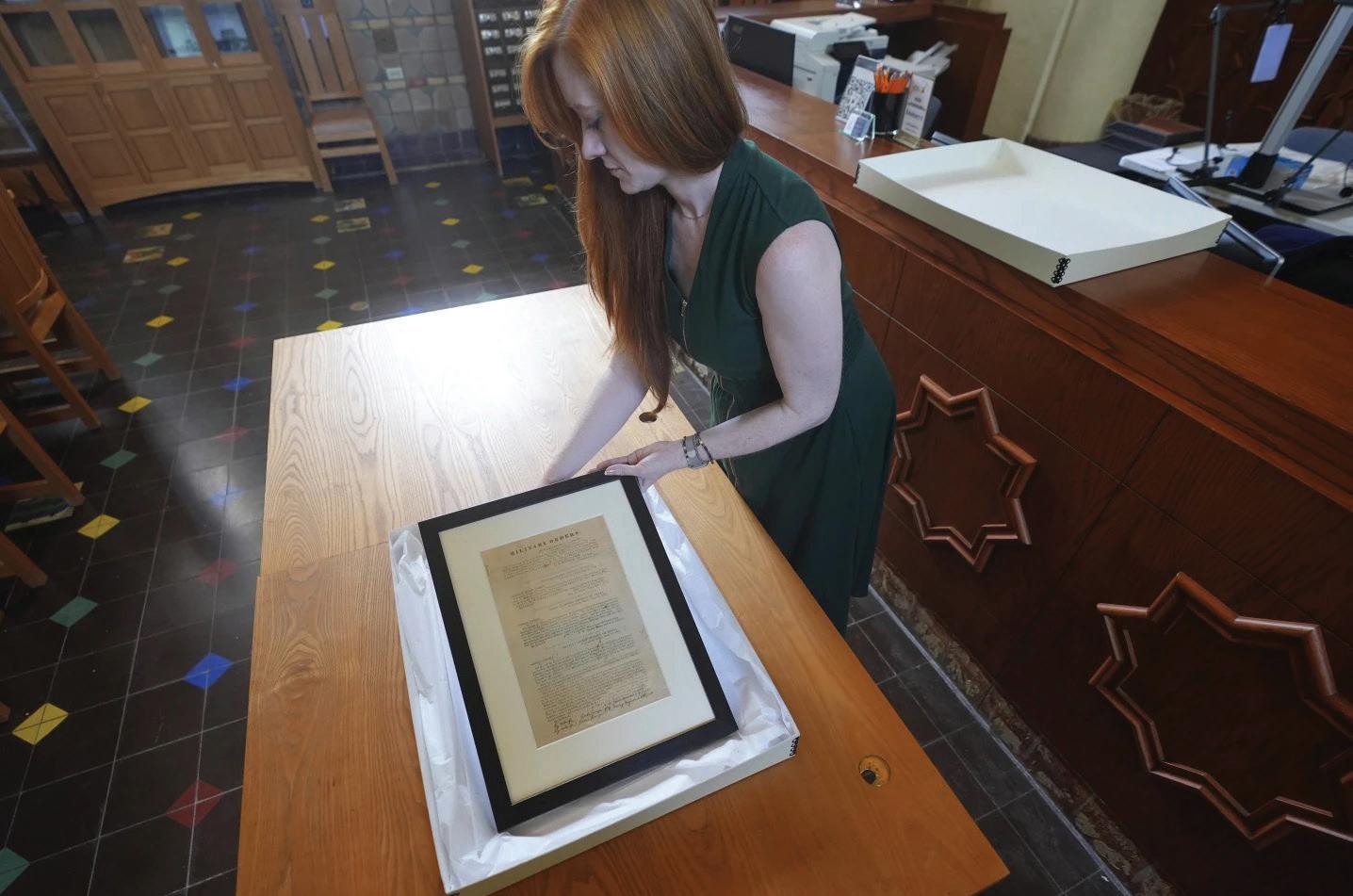

Barbara Grey
Richmond airport resumes international flights after decade-long gap
Free Press staff report
Richmond International Airport resumed international passenger service last week with BermudAir flights to Bermuda, ending a decade-long gap in overseas connections.
The twice-weekly service to Hamilton, Bermuda, breaks a lengthy drought that left Richmond among the few mid-sized U.S. cities without direct international routes. Richmond lost its last international service in the mid-2010s as airlines consolidated at larger hubs, forcing travelers to connect through Washington or Charlotte.
BermudAir operates Wednesdays and Saturdays using Embraer regional jets for the two-hour flight to the British territory, targeting leisure travelers drawn to Bermuda’s beaches and golf courses.
“We are proud to partner with BermudAir to offer a seamless, two-hour connection between Virginia’s Capital Region and one of the world’s most stunning island destinations,” said Perry J. Miller, president and CEO of the Capital Region Airport Commission.
The service comes as smaller airports struggle to attract international carriers that prefer high-traffic hubs. Richmond handles about 4 million passengers annually, making it Virginia’s second-busiest airport after Washington Dulles.
BermudAir, founded in 2023, has expanded its North American network from Bermuda, recently adding larger Embraer 190 aircraft to complement its E175 fleet.
“Richmond’s blend of history, innovation, and Southern charm makes it an ideal match for Bermuda,” said Adam Scott, BermudAir’s founder and CEO.
The flights offer business and economy seating with complimentary refreshments. Airport officials hope the service will boost tourism and business connections in the Richmond region, which generates about $2.1 billion annually in aviation-related economic activity.


Early in-person voting for the June 17 primary election continues through Saturday, June 14. Richmond voters can cast their ballots at the Office of Elections at 2134 W. Laburnum Ave., City Hall at 900 E. Broad St., and the Hickory Hill Community Center at 3000 E. Belt Blvd. Voting hours are Monday through Friday from 8:30 a.m. to 5 p.m., with additional Saturday hours on June 14 from 9 a.m. to 5 p.m.
Henrico County residents can vote at the Henrico Western Government Center at 4305 E. Parham Road and the Eastern Government Center at 3820 Nine Mile Road, Monday through Friday from 8 a.m. to 4:30 p.m. The Varina Library at 1875 New Market Road is also open Monday through Friday from 8 a.m. to 4:30 p.m. All locations will be open on Saturday, June 14 from 9 a.m. to 5 p.m.
Five mail drop boxes are available at the following Henrico County locations: the Administration Annex at the Henrico Western Government Center, the Eastern Government Center, Deep Run Park Recreation Center at 9900 Ridgefield Pkwy., the Varina Library and the Tuckahoe Area Library at 1901 Starling Drive.
In Chesterfield County, early voting is being held at the Central Library at 7051 Lucy Corr Blvd. through Saturday, June 14. Voting hours are Monday through Friday from 9 a.m. to 5 p.m., and June 14 from 9 a.m. to 5 p.m.
A ballot drop box and curbside voting for individuals with disabilities or voters age 65 and older are available at the Central Library. Another drop box is available at the Office of the General Registrar at 9848 Lori Road, open weekdays from 8:30 a.m. to 5 p.m. through Friday, June 13, and on June 14, and Monday, June 16, from 8:30 a.m. to 5 p.m.
In Hanover County, early voting is taking place in the Wickham Building at the Hanover Courthouse Government Complex at 7497 County Complex Road. Hours are Monday through Friday from 8:30 a.m. to 4:30 p.m., and June 14, from 9 a.m. to 5 p.m. Curbside voting is available for voters with disabilities or those age 65 and older.
A ballot drop-off station is located at the Wickham Building and will remain available until 7 p.m. on Tuesday, June 17. No excuse is needed to vote early in Virginia. Voters must bring an acceptable form of identification or be prepared to sign an ID confirmation statement. For more information, visit elections.virginia.gov.

Slices of life and scenes in Richmond
scheduled to open in early
Millions expected to attend “No Kings” protests throughout Virginia, U.S.
By George Copeland Jr.
On June 14, protesters nationwide plan to rally against the Trump administration in a series of coordinated events.
The “No Kings Day of Defiance” is being organized by local, state and national groups in response to actions of President Donald Trump and his administration. The events are planned to oppose a military parade and celebration scheduled for Trump’s birthday, which falls on the same day as Flag Day and the Army’s 250th anniversary.
Similar events have taken place across the country and around the world in the months since Trump returned to the White House, including “No Kings Day” protests on Presidents’ Day.
“Across all 50 states, communities will gather to declare: the president is not a king,” organizers stated in a press release. “From city blocks to small towns, from courthouse steps to community parks, we’re taking action to reject authoritarianism — and show the world what democracy really looks like.”
In Richmond, an assembly will be held from 5 to 7:30 p.m., beginning with a gathering under the Bell Tower in the Virginia State Capitol, followed by a march at 6 p.m. to Kanawa Plaza for another gathering at 6:30 p.m. Several other events will be held throughout the day statewide.
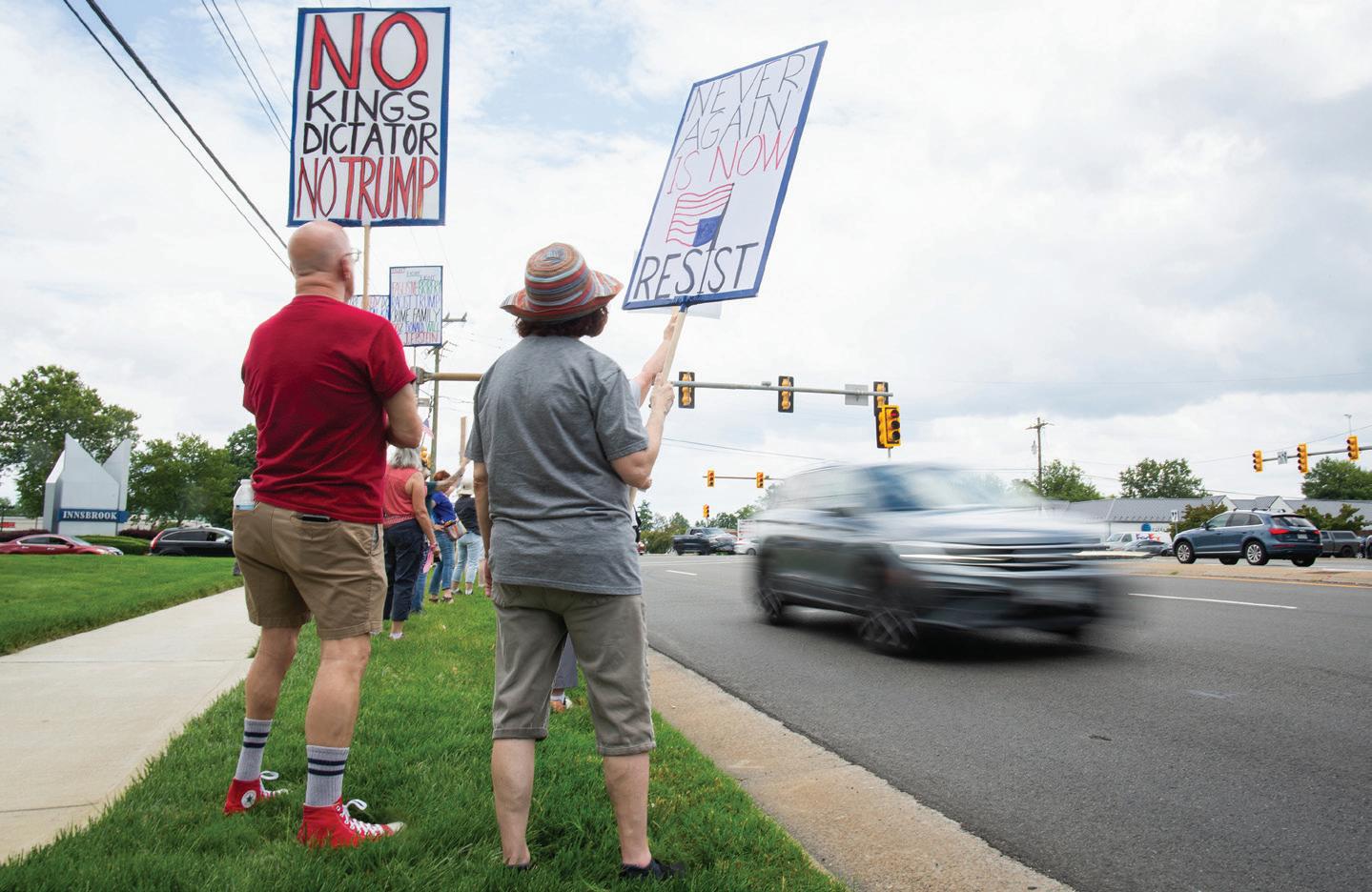
Millions of protesters across over 1,800 locations are projected to be a part of the mobilization, according to organizers, and partner organizations include the 50501 Movement, American Federation of Teachers, the Human Rights Campaign and Indivisible among many others.
The organizing coalition behind the day
of action have also continued to criticize Trump in the days leading up to the event, including denouncing his administration’s military response to protests in Los Angeles against the actions of ICE officers in the community. More information can be found at nokings.org and 50501va.com.
Richmond Ed Fund adds four to board as work with schools expands
The Richmond Ed Fund has added four new members to its board as the nonprofit expands its efforts to support Richmond Public Schools through increased funding and strategic initiatives.
The new members are Jae K. Davenport, Gregory Hutchings Jr., Martin P. Klein and Delores McQuinn. The organization, formerly known as the Richmond Public Schools Education Foundation, has shifted in recent years from providing programs to operating as a venture fund supporting educational innovation.
“This is a powerful step forward,” said Dave Mills, chair of the Richmond Ed Fund board. “Each new member brings strategic clarity, cross-sector experience and an unshakable belief in what’s possible for Richmond’s students.”
The appointments come as the nonprofit’s annual budget has increased fivefold over the past two years. Its current initiative, RPS Thrives, aims to accelerate opportunity and educational mobility for Richmond students.
“I’m thrilled to work closely with these giants from their respective industries,”
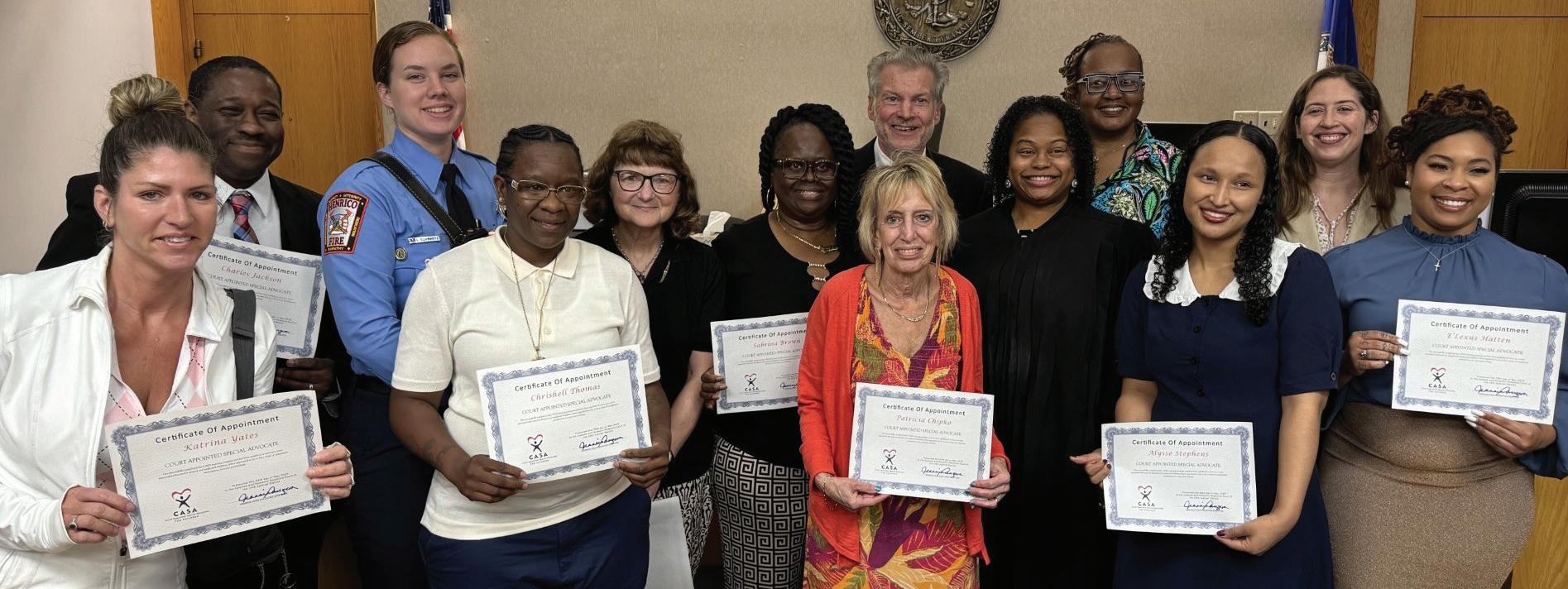
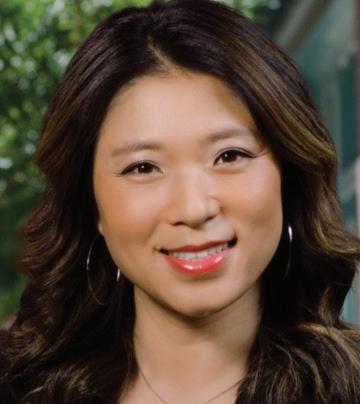
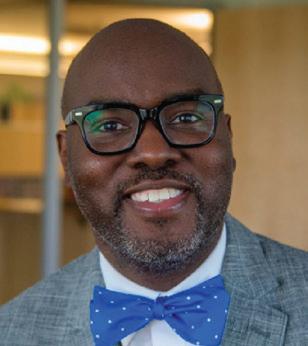
said Taikein Cooper, president and CEO of the Richmond Ed Fund. “These new board members are ready to help us unlock opportunity, mobility and a choice-filled future for every student.”
Among the new appointees is Jae K. Davenport, president of Davenport Strategies and former deputy secretary of public safety and homeland security under Gov. Ralph Northam. She is a Richmond Public Schools parent and longtime public servant with expertise in public policy and youth-focused community development.
Founder and CEO of Revolutionary ED, Gregory Hutchings Jr. also joins the board. Hutchings is an assistant professor at Howard University, a former school superintendent and a national voice in equity-focused school redesign. He co-
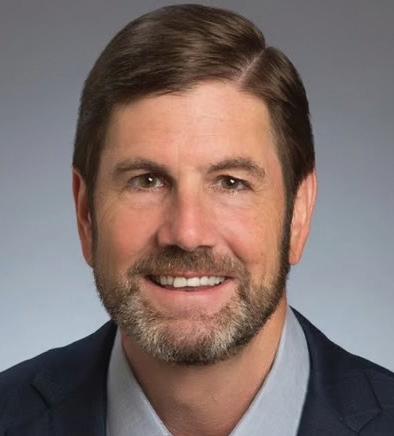
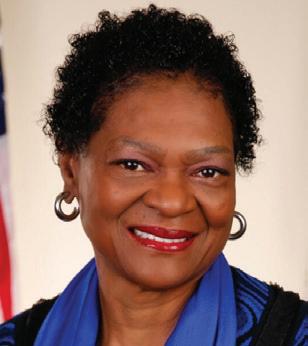
Martin P. Klein
authored “Getting into Good Trouble at School: and has more than two decades of experience in education.
With over 40 years in financial services, Martin P. Klein brings extensive experience to the board. Currently senior advisor at Athene and partner at Apollo, Klein has held leadership roles at Genworth, Lehman Brothers and Barclays. He is expected to guide the nonprofit’s long-term financial planning and expansion.
Delores McQuinn serves in the Virginia House of Delegates and has been a longtime advocate for education and infrastructure. Her experience includes serving on the Richmond Public Schools board and Richmond City Council. For more information, about the Richmond Ed Fund visit richmondedfund.org
New advocates to aid Henrico foster children, court cases
Free
Henrico Court Appointed Special Advocates (CASA) recently welcomed 12 new volunteers, joining nearly 100 others who assist children affected by abuse or neglect. These advocates work with children involved in the court, foster care and child welfare systems, building trusted relationships and providing vital information to help judges make decisions in the children’s best interests. While not all children served by Henrico CASA live in foster care, about 24% of those
assisted last year were under the custody of the Department of Social Services.
“Foster Care Awareness Month allows us to reflect on the challenges children face during times of change and uncertainty,” said Jeannine Panzera, Henrico CASA’s executive director. “They need to know someone is standing by their side, and that’s exactly what our advocates do.” Henrico CASA will host a virtual information session for prospective advocates on July 23. Since 1994, the organization has served more than 4,400 children in Henrico’s juvenile court system. For more information, visit henricocasa.org.
In conjunction with the publication of [re]Framing Protest (NOW): Design + Hope, this reprise of the 2022 exhibition spotlights the role of creative expression in Richmond’s 2020 Black Lives Matter protests. Developed by Richmond Free Press photojournalists Regina H. Boone and Sandra Sellars, with writer and creative strategist Nichole Christian, the exhibit documents 65 days of activism through striking images and public art. From murals and graffiti to performances and repurposed monuments, artists and citizens transformed the city—especially Monument Avenue—into living canvases of resistance, mourning, and fearless hope, reframing public space as a site of healing and change.
On view June 19 — July 12, 2025.

Free Press staff report
Shalom Farms has launched a new Produce Prescription program aimed at helping Richmond residents manage chronic illnesses through increased access to fresh fruits and vegetables.
The nonprofit’s new initiative, known as Produce Rx, connects eligible participants with free produce, bi-weekly cooking instruction and nutrition education in partnership with Health Brigade, a Richmond health care provider. The program is supported by funding from the USDA’s Gus Schumacher Nutrition Incentive Program (GusNIP).
The Produce Rx program includes a 12-week active phase, during which participants receive fresh produce and attend hands-on cooking classes with Jason Muckle, owner and instructor at CHEW. That is followed by a 12-week sustainability phase, which provides $30 weekly vouchers for produce at any of Shalom Farms’ 12 Mobile Market locations across the city.
“This program is about bringing patients together in community and practically reaching their goals,” said My’Kal Lofton, Produce Rx manager at Shalom Farms. “It’s about recognizing what is broken about our community and celebrating what’s working.”
The initiative is part of a growing national movement to treat food as medicine—particularly for those navigating conditions like hypertension, type 2 diabetes and obesity. It is also designed to reduce food insecurity and support longterm wellness.
As part of the program’s development, a team from Shalom Farms attended the GusNIP National Convening in Minneapolis, hosted by the Nutrition Incentive Hub. The event brought together USDA officials, researchers, and community health leaders from across the country to exchange ideas on the future of nutrition-based health care.
“The most powerful part of the convening was visiting food hubs, farms, clinics and community spaces where this work is already happening,” said Änna Ibrahim, executive director of Shalom Farms. “Seeing the many ways other organizations are translating food-as-medicine from theory into real, local impact was both insightful and energizing.”
Continued from A1


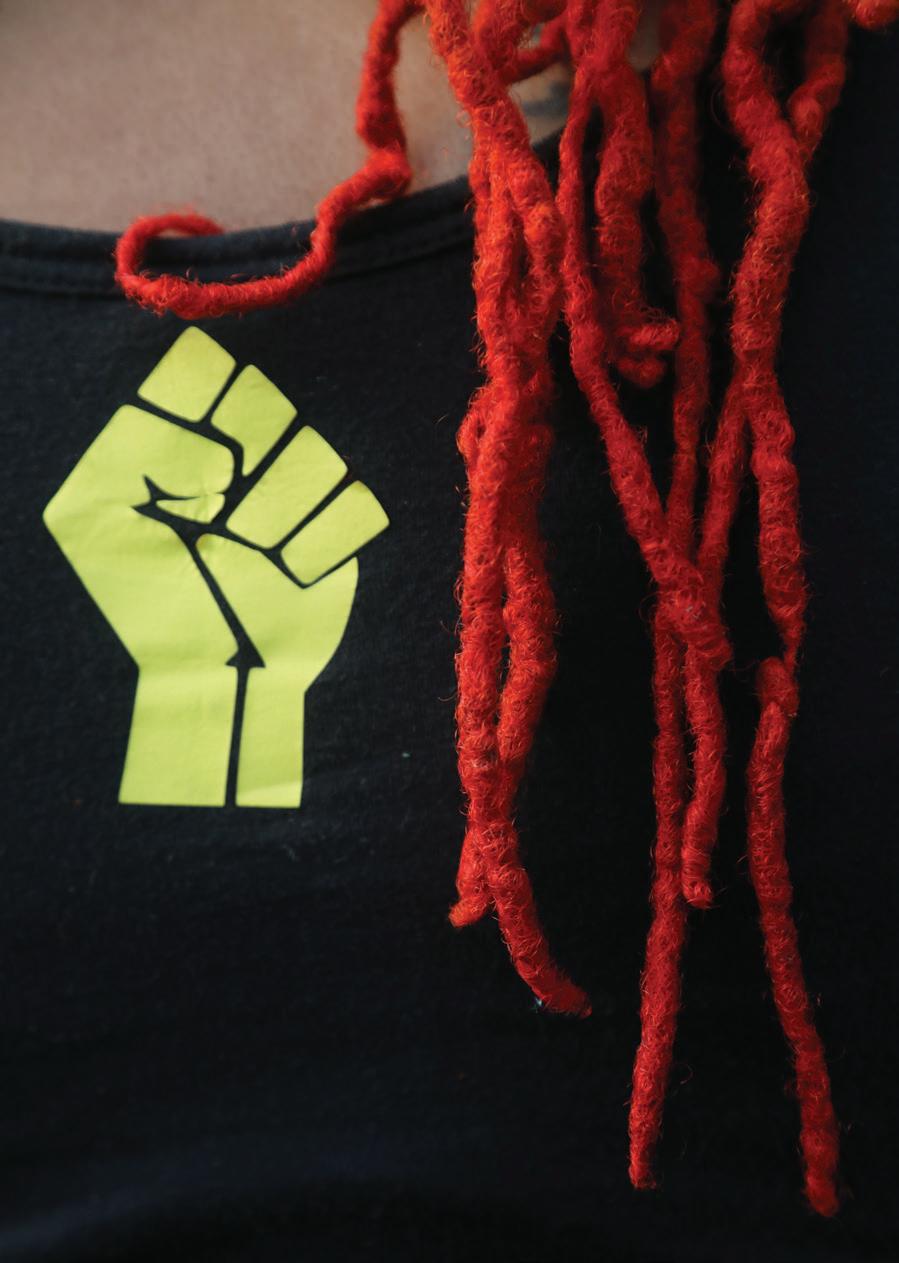
‘(re)Framing Protest (Now)’ exhibition comes to Branch Museum
Continued from A1
ences to the museum. Now, as the renamed Branch Museum of Design, the institution sees the returning exhibition as part of its evolving mission.
“I think it’s really important for us, not just as a design museum but as a public institution on Monument Avenue, to continue having conversations about meaningful, impactful design,” said Deputy Director Katie Foster, “but also to be a safe space for expression and creation and to be a public institution for all.”
its message. A new catalog featuring a wider selection of photographs will accompany the show, alongside “Echoes of Us,” an exhibition of work from Black artists across Virginia.
For Boone, the updated title’s emphasis on “Now” reflects the 2020 protests’ ongoing relevance. “The same thing that happened in 2020 could happen all over again,” she said. “Even though we’re living in a time of so many challenges, there still is a possibility for things to move forward.”
The exhibition returns amid continued global protests and political upheaval, lending new urgency to
“(re)Framing Protest (Now)” and “Echoes of Us” run June 19 through July 12.
In addition, David Levine was announced as Richmond’s new General Registrar by the Richmond Electoral Board. Levine starts the position Tuesday, July 1, following a nationwide search to fill the vacancy left by Keith Balmer’s departure late last year amid an investigation into misconduct and misuse of funds.
“He’s worked in a lot of aspects of elections and has a wealth of knowledge about the industry,” Electoral Board Chair Starlet Stevens said. “He comes to us with excellent qualifications.”
Also last week, Gregory Hopkins was named director of the city’s new Office of Gun Violence Prevention during a national gun violence awareness press conference at City Hall.
Hopkins brings over 20 years of juvenile justice experience from the Virginia Department of Criminal Justice Services, where he supported policy and programs aimed at juvenile justice, delinquency prevention and racial equity.
“He is an experienced and compassionate expert,” Avula said. “Together, if aligned, I know that we can create a Richmond where every child and every family and every neighborhood is safe from gun violence.”
Hopkins’ appointment follows the recent creation of the Office of Gun Violence Prevention, announced alongside initiatives including the designation of the first Friday in June as National Gun Violence Awareness Day in Richmond.
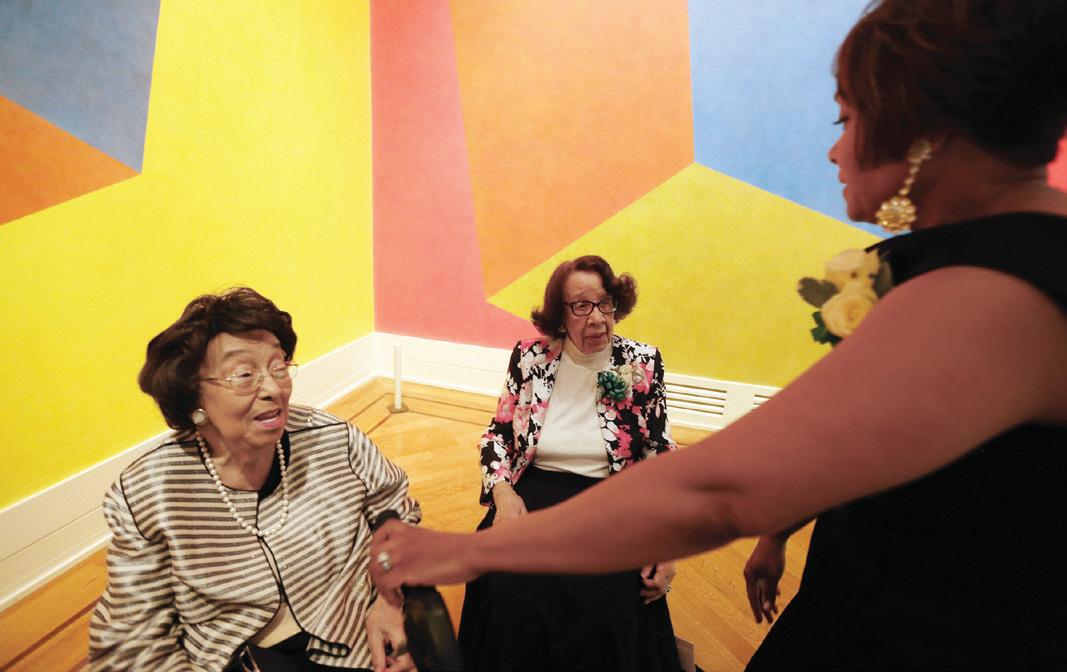
Barbara Grey, celebrated Richmond educator and mentor, dies at 99
Continued from A1 business of the city done.”
original thinker and a creative spirit,” DiPasquale said. “She was such a positive force in the world. I’m going to miss her a lot.” Grey received multiple accolades, including recognition from the U.S. Department of Education, which named John B. Cary Elementary School — later renamed Lois Harrison-Jones Elementary — one of the nation’s 15 top schools while she was principal. She was also honored as Richmond’s “Woman of the Year” in 1988 by Style Weekly and received the Richmond History Makers Humanitarian Award in 2016.
Although Grey retired from education in 1990, she continued working, including as director of the Virginia Union University Museum Art Galleries, where she helped curate and preserve African-American art. Those close to her say her welcoming, teaching approach remained evident after retirement and continued to influence those around her.
“She inspired me to soar, to be creative, to be my full self, to even be calm and to just be a good person,” Grey’s student, goddaughter and photojournalist Regina H. Boone said, “living with purpose just as she modeled perfectly for me and so many.” Grey was preceded in death by her husband, parents and three sisters. She is survived by two sons, Michael Grey and Robert J. Grey Jr. Funeral arrangements are pending.
Continued from A1
of the Confederacy. But it didn’t mean immediate freedom.
“It would take the Union armies moving through the South and effectively freeing those people for that to come to pass,” said Edward T. Cotham Jr., a historian and author of the book “Juneteenth: The Story Behind the Celebration.”
The proclamation didn’t apply to the border states that allowed enslavement but didn’t leave the Union, nor the states occupied by the Union at the time, said Erin Stewart Mauldin, chair of Southern history at the University of South Florida in St. Petersburg.
“You have to think of emancipation as a patchwork,” she said. “It doesn’t happen all at once. It is hyper local.”
Still, she said, the proclamation “was recognized immediately as this watershed moment in history.”
“The Emancipation Proclamation is the promise that the end of slavery is now a war aim,” Mauldin said.
Texas at the end of the war
As the war progressed, many enslavers from the South fled to Texas, causing the state’s enslaved population to grow from about 182,000 in 1860 to 250,000 by the end of the war in 1865, Mauldin said.
Cotham said that while enslaved people were emancipated “on a lot of different dates in a lot of different places across the country,” June 19 is the most appropriate date to celebrate the end of slavery because it represents the “last large intact body of enslaved people to be freed.”
He said many enslaved people across the South knew of the Emancipation Proclamation, but that it didn’t mean anything until troops arrived to enforce it.
About six months after General Order No. 3 was issued, the 13th Amendment abolishing slavery was ratified. General Order No. 3
The order begins by saying “all slaves are free” and have “absolute equality” of rights. Going forward, the relationship between “former masters and slaves” will be that of employer and hired laborer.
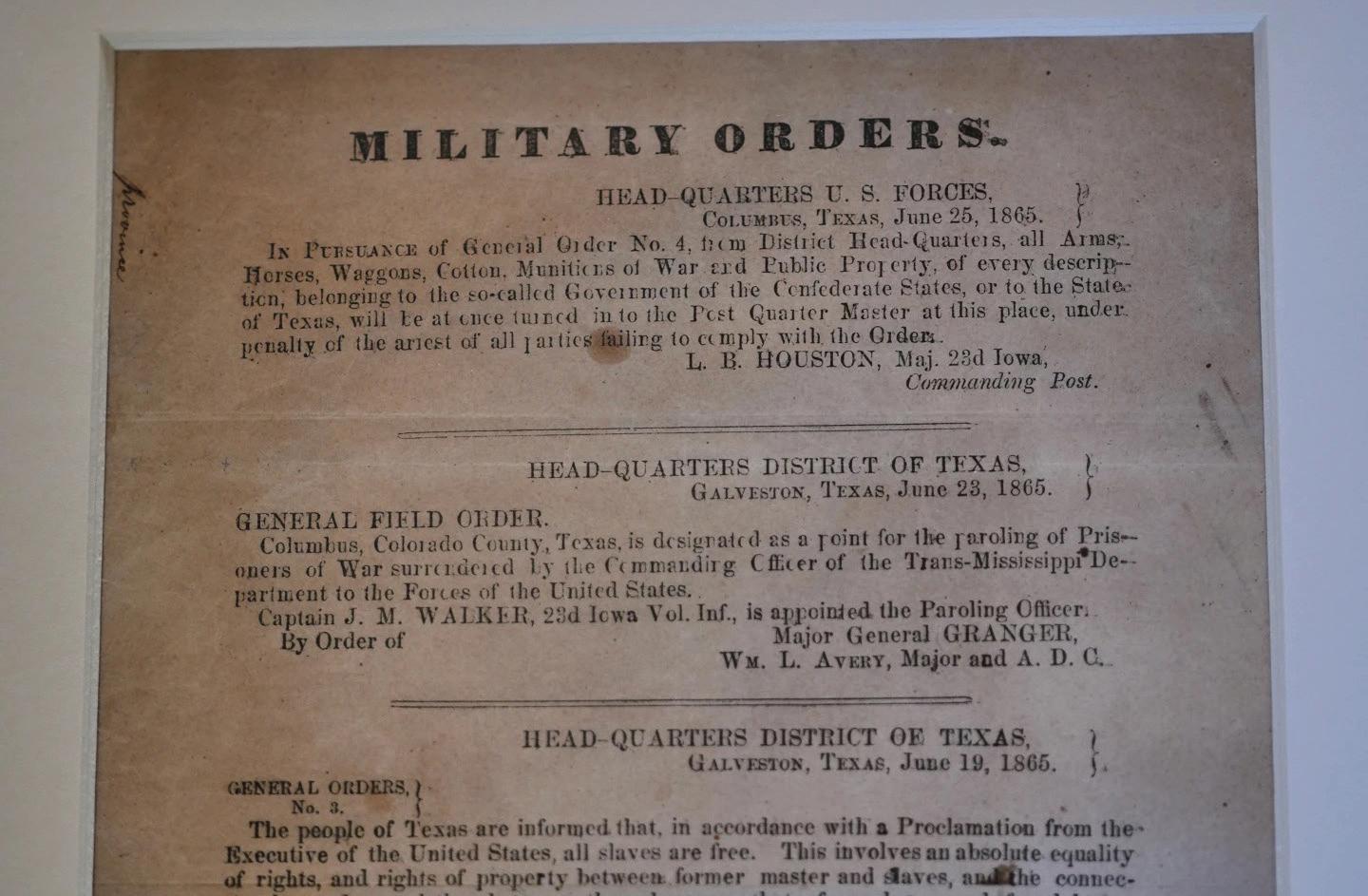
It advises freedmen to “remain at their present homes and work for wages,” adding that they must not collect at military posts and “will not be supported in idleness.”
The handbills were also handed out to church and local officials. Cotham said Union chaplains would travel from farm to farm to explain the order to workers, and many former enslavers read the order to the people they had enslaved, emphasizing the part about continuing to work.
The Dallas Historical Society’s handbill came from the collection of newspaperman George Bannerman Dealey, who founded the society, said Karl Chiao, the society’s executive director. Dealey began working at a Galveston newspaper in 1874 before being sent to Dallas by the publisher to start The Dallas Morning News.
Chiao said their handbill is the only one they know of that still exists. The National Archives holds the official handwritten record of General Order No. 3. What freedom looks like
“Some of the people who were set free stayed on the plantations and worked for their former owners, others left, they went
to Houston, to Dallas, or they went to San Antonio seeking work,” said W. Marvin Dulaney, deputy director of the African American Museum of Dallas.
While there was excitement, the newly freed people knew they had to “build up what citizenship looked like for them,” Hopkins of Rice University said, and that there was still “a lot of work to do.”
“You changed the relationship between the enslaver and the enslaved but you didn’t change the culture or the societal norms with how enslavers treated enslaved people,” she said.
Mauldin said participants in early Juneteenth celebrations were “incredibly brave,” noting that by 1868, the Ku Klux Klan was established in Texas. They were celebrating their freedom, she said, “under constant threat of violence.”
“It does take time for sort of what freedom is going to look like to be made real, and in large part the reason that freedom is made real is because of ex-slaves pushing for what they think freedom should be,” Mauldin said. “It’s not being given to them, they are actively fighting for it.”



Colette McEachin

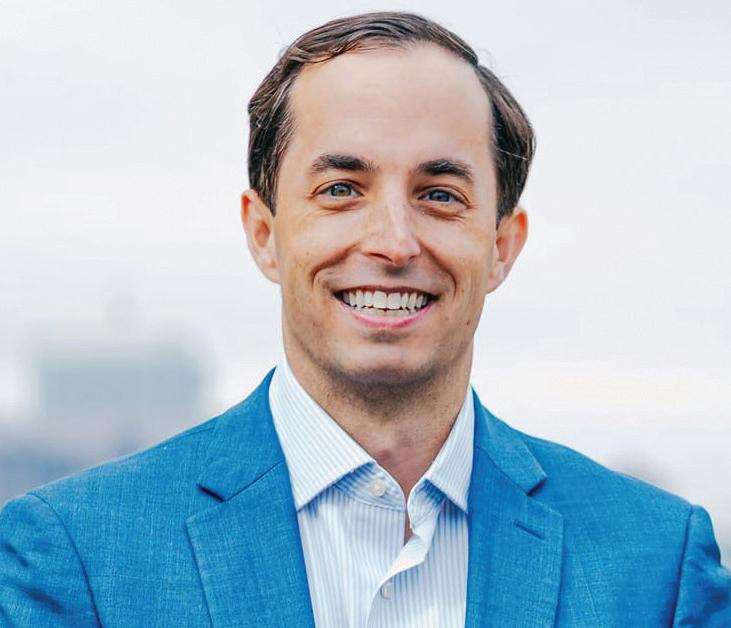
Tom Barbour
By Graham Moomaw
Four years after losing a primary challenge against Richmond Commonwealth’s Attorney Colette McEachin, Richmond lawyer Tom Barbour is taking another shot at unseating the city’s top prosecutor.
The two candidates are competing in a Democratic primary on June 17, and the winner will be a virtual lock to win the general election in a heavily Democratic city where Republicans rarely bother to field candidates.
McEachin ran unopposed in the 2021 general election after winning more than 73% of the primary vote against Barbour that year, when Barbour ran as a progressive challenger and accused McEachin of having outdated views on criminal justice.
The battle lines are a little different in 2025. Barbour is campaigning on a platform of bringing a more proactive approach to using the prosecutor’s office to tackle city problems like traffic safety, gun violence and public corruption. McEachin, he argues, is too willing to accept the status quo.
“I think we’re stagnating,” he said in an interview when asked for his views on Richmond’s public safety trends. “And it’s because we’ve got a commonwealth’s attorney’s office that’s out of touch.”
McEachin is largely running on her experience and crime statistics that show violent crime in Richmond has fallen during her tenure, which began in 2019.
“What I bring to this job is decades of experience actually prosecuting felony crimes at all levels in the city of Richmond,” McEachin said in an interview. “And Tom Barbour is woefully inexperienced at doing any of that.”
McEachin, 69, became Richmond’s chief prosecutor when former commonwealth’s attorney Mike Herring stepped down for a job at the McGuireWoods law firm. She is the widow of the late state senator and congressman A. Donald McEachin, who died in 2022 after a battle with cancer.
Coming from a family steeped in politics, McEachin has big-name endorsements from U.S. Sen. Tim Kaine, D-Va., Democratic gubernatorial nominee Abigail Spanberger, U.S. Rep. Jennifer McClellan, D-Richmond, and numerous other state and local leaders.
As of March 31, McEachin reported having nearly $77,500 banked for her campaign, compared to about $43,600 for Barbour. Barbour’s endorsements are more local. His backers include City Council member Andrew Breton (1st District), School Board Member Ali Faruk (3rd District) and several other former city officeholders and activists.
Barbour, a 40-year-old criminal defense attorney whose wife works as a public defender, previously worked in the prosecutor’s office as a policy adviser under Herring. He says he came to Richmond as a “differently situated young lawyer” after serving as a captain in the U.S. Marine Corps, which involved embedding with the Iraqi army and Afghan border police.
“Anything that you see the Richmond Police Department doing I have either personally probably done it, or I have trained people to do that work,” Barbour said.
At a recent debate held by the Richmond City Democratic Committee, McEachin dismissed Barbour’s military experience as irrelevant to the job he’s running for.
“I find it laughable that Mr. Barbour would say that his experience policing people in a military operation has anything to do with providing public safety to the city of Richmond,” she said.
McEachin also has downplayed Barbour’s previous role in the office she now leads, stressing he only worked as a prosecutor for 10 months while she’s done it for more than two decades.
Barbour said in his role as a trial attorney, he’s always on the side of tenants in housing cases and always on the side of workers in employment disputes. He also has a small nonprofit that connects people with services to reduce recidivism and gain stability to avoid future encounters with the criminal justice system.
He said he sees himself as a “well-rounded public safety professional” that could bring a more dynamic approach to the office.
“I’m running because I think we’re missing significant opportunities for public safety in Richmond,” Barbour said. Crime trends
Though crime spiked nationwide during the COVID-19 pandemic, McEachin says Richmond’s data show her office has been effective on the public safety front.
In 2019, the city logged 1,201 violent crimes. Last year, that number was 967, which Police Chief Rick Edwards characterized as a remarkably low figure during a crime briefing earlier this year
Property crimes have risen under McEachin’s tenure, g from 8,541 in 2019 to 9,301 in 2024. She said that mostly reflects increases in thefts from vehicles and shoplifting from ABC stores and dollar stores.
“No one wants any segment, either the violent crimes or the property crimes, to go up, McEachin said. “But if I have my druthers? If I have to choose? I would prefer it to be a person’s property and not their body.”
Barbour said there’s still a perception among outsiders that
Richmond is dangerous, a view that could be better combated with more focus by the prosecutor’s office.
Richmond’s efforts to become more friendly to pedestrians and bicyclists, he said, won’t work without “good traffic enforcement.” Similarly, he said, the number of shootings also inhibits Richmond’s success.
“You can’t have continued development of business and places to eat and places to enjoy with your family and friends if you have intractable gun violence,” he said. Gun violence
Barbour has specifically faulted McEachin for not making more use of Virginia’s red flag law, which the General Assembly passed in 2020 in an attempt to prevent mass shootings and violence perpetrated by people showing warning signs of potentially dangerous behavior. The law allows authorities to temporarily seize guns from people believed to be a threat to themselves or others.
McEachin said there have been a handful of cases of the red flag law being used in Richmond, mostly by potential victims of domestic violence when the suspected abuser is known to have a gun. Barbour argues she should be doing a lot more, stressing that state law empowers prosecutors to initiate red flag orders against potentially dangerous people rather than relying on citizens to start the process.
“The office currently doesn’t view itself as a stakeholder to real-time gun violence prevention,” he said. “It views its job to sit there and wait for a case to come in and then prosecute that case. But by the time a case comes in, we’ve already lost one life or someone’s already been seriously injured.”
In addition to pursuing more red flag orders, Barbour said the prosecutor’s office should be a more “proactive stakeholder” in the city’s efforts to prevent shootings before they happen.
“The commonwealth’s attorney has to be involved with intervening early with people who are at high risk of involvement in gun violence,” Barbour said.
McEachin said Virginia’s red flag law was designed as a “preventative measure” that wouldn’t be particularly effective in dealing with the type of shootings seen in Richmond.
“They’re not being used to prevent felons from getting firearms,” she said, adding that city police mostly confiscate firearms through the normal course of investigating crimes involving guns.
At the debate, McEachin argued her power is limited because the red flag process requires a law enforcement investigation before her office can seek a red flag order.
“They can’t just come in on somebody’s word and take a gun,” McEachin said.
When the law was being debated in the state legislature, Republicans criticized it as allowing authorities to take guns based solely on the word of someone seeking a red flag order. The purpose of the law was to give police and prosecutors more power to act on warnings from family members, romantic partners and mental health professionals, without the type of timeintensive investigation needed to prove a crime was committed. Traffic safety
Barbour also has argued the city could get tougher on drivers involved in serious traffic accidents.
“I think we’re not really taking reckless driving and traffic violence seriously,” he said. “It’s making our streets dangerous.”
He has suggested putting drivers on probation for six months for reckless driving offenses involving speed more than 20 miles per hour over the posted limit, which would leave them with a restricted license until they can show they’ve learned to drive safely. Under the current system, he said, drivers can simply take an online safety class and have a reckless driving charge dismissed.
“Richmond’s courtrooms are the most lax on enforcement that I have seen, and I think that’s generally known and understood,” he said. “The first thing we need to do is actually aggressively prosecute reckless driving and speeding on local roads.”
Barbour has pointed to two high-profile incidents — the recent car vs. bicycle collision involving Mary Munford Elementary School Principal Greg Muzik and the 2023 crash that killed VCU student Shawn Soares — as examples of how Richmond is soft on drivers. Both of those cases, Barbour contends, could have been presented to a grand jury to see if serious charges were warranted.
The two drivers involved in the Soares crash were charged with traffic offenses, but there were no criminal charges related to the death. No charges were filed against the driver in the Muzik collision.
McEachin said Barbour is attempting to seize on emotions surrounding the Muzik case and the not necessarily correct assumption that the driver of the car that hit Muzik’s bicycle must have been at fault.
“Tom just feeds into that flame,” she said. “And that is not the job of a prosecutor. The job of a prosecutor is to step back, look at the evidence, look at the law, and see whether or not there is in fact a violation of the law that should be prosecuted. And in that case, there was not.”
Speeding is a multifaceted issue, McEachin said, involving road design, enforcement by city police and a “crash team” her office has formed to dig into the specifics of serious crashes. But
not every traffic-related tragedy, she said, is a “felonious event.”
“You have to look at each of those circumstances individually and not let your emotions or the public emotion sway your independent, cool-headed review as a prosecutor,” she said. “And that’s what Tom doesn’t get.” Restorative justice
McEachin often emphasizes that her office isn’t interested in using incarceration as the first or only way to change someone’s behavior, pointing to “restorative justice” initiatives she’s launched over the last few years through her office’s Community Justice Reform Unit
The incumbent has also faulted Barbour for allegedly failing to understand Richmonders and crime victims want “some level of accountability” for misconduct.
“Accountability does not necessarily mean that everybody gets locked up on their first offense for the most non-serious offense,” McEachin said. “We’re not throwing people convicted of petty larceny in the Richmond city jail for 12 months.”
Barbour has characterized McEachin’s criminal justice reform efforts as lackluster, stressing that only about 20 people have gone through the main restorative justice program that McEachin founded in 2021 that tries to seek reconciliation between offenders and their victims that keeps them out of the criminal justice system. That relatively small number, Barbour argues, raised doubts about McEachin’s commitment to progressive reform, which she stressed as a priority in her 2021 campaign.
“That is either an intentional falsehood, intentional misrepresentation about whether they were ever committed to that,” Barbour said. “Or it’s a complete failure. And either way it’s totally unacceptable.”
Asked for his general thoughts on whether the criminal justice system is too strict or too lenient, Barbour said “we don’t need a criminal justice system, we need a public safety system.”
“I think for nonviolent people in the system especially, we need to be focused on smart reforms that reduce recidivism, that help people address the circumstances of why they’re committing these acts and help move them out of offending,” Barbour said. McEachin stressed her restorative justice program relies on victims giving their approval for her office to take a lighter touch on minor offenses like breaking into a shed or damaging a car. The 20 people who have been benefited so far, she said, means “there are 20 people in Richmond who don’t have a criminal conviction.”
“Maybe that’s not enough for him,” McEachin said of Barbour. “That is a good start for me, and it’s just going to continue to get better.”
Public corruption
Barbour also argues the prosecutor’s office could play a bigger role in helping to restore Richmonders’ faith in local elections and government by taking a more active stance against public corruption.
He has pointed to the issue that arose last year in the 6th District City Council race in which former Council Liaison Tavares Floyd was accused of reporting incorrect info about his campaign finances and sources of income on official election paperwork. Several people Floyd listed as donors to his campaign said they had not actually given him money. Floyd denounced the allegations, but never offered a clear explanation before he lost to incumbent Ellen Robertson.
Under Virginia law, filing deliberately false campaign finance paperwork is considered a form of election fraud and punishable as a felony offense.
When asked about the Floyd issue, McEachin initially brushed aside media inquiries, saying her office had no power to investigate it and wouldn’t confirm such an investigation if it existed.
“The Tavares Floyd case is a good example of the TimesDispatch and other journalists like yourself essentially doing the public corruption investigative work to surface these allegations,” Barbour said. “But then nothing happens.”
McEachin, who previously said her office is looking into Floyd’s campaign but has declined to elaborate, said it’s not her practice to “tarnish an individual’s name and reputation” by loudly announcing an investigation that might not lead anywhere.
“That bell cannot be unrung,” she said. “It just amazes me that he thinks that it is somehow ethical to give details about whether or not an investigation exists, because the mere allegation that there’s an investigation can tarnish and live with someone afterwards.”
McEachin also has declined to comment on at least one case involving the alleged misuse of public funds even after a City employee was charged with a crime.
In addition to the Floyd issue, Barbour said, the prosecutor’s office could get more actively involved in situations involving the misuse of public funds, such as last year’s internal investigation that found widespread mismanagement in the City’s Election Office and numerous Times-Dispatch articles about violations involving City-issued spending cards.
“What would you do if you saw a crime happen in front of you on the street?” Barbour said. “Call the police. That’s all a commonwealth’s attorney’s office needs to do.”
Election Day for the primaries is June 17.
This article originally appeared on TheRichmonder.org
Feed More and the Virginia Department of Social Services are expanding efforts to fight food insecurity among children and teens during the summer break.
Feed More has launched its annual Summer Food Service Program, offering free weekday breakfast and lunch to youth 18 and under throughout the Richmond region and Tri-Cities area. No registration is required, and meals are available on a first-come, first-served basis at approved locations. The program began this week and is designed to support families whose children may lack regular access to meals outside of the school year.
Last summer, Feed More distributed more than 31,000 meals through the initiative. This year, a list of participating meal sites is available and updated throughout the season at FeedMore. org/summer.
Feed More serves 34 counties and cities in Central Virginia through more than 380 distribution partners. It is a member of Feeding America and Meals on Wheels America.
In addition to local meal service, the Virginia Department of Social Services is relaunching Virginia SUN Bucks, a summer grocery benefit program in partnership with the U.S. Department of Agriculture’s Food and Nutrition Service.
Beginning in July, qualifying families will receive a one-time $120 per-child benefit to help purchase groceries when school meals are unavailable. Families already enrolled in the Supplemental Nutrition Assistance Program (SNAP) will receive SUN Bucks on their existing EBT cards, while others will be mailed a separate SUN Bucks EBT card.
The benefit can be used to buy eligible food items at grocery stores, farmers markets and other authorized retailers.
“We are proud to have Virginia SUN Bucks as a resource in
our ongoing efforts to reduce food insecurity and help families achieve greater self-sufficiency,” said James Williams, commissioner of the Virginia Department of Social Services.
In its 2024 pilot year, Virginia SUN Bucks reached more than 713,000 children, with nearly 550,000 enrolled automatically. This summer, children will be automatically enrolled if they received free or reduced-price meals during the 2024-25 school year, or if their households already participate in SNAP, Temporary Assistance for Needy Families (TANF), or an incomebased Medicaid program.
Families who are not automatically enrolled but believe they qualify based on income can apply for benefits. A printable application is available at virginiasunbucks.com, or families can apply by phone from July 1 to Aug. 30 by calling 866-513-1414 weekdays from 9:15 a.m. to 6 p.m. More information also is available at virginiasunbucks.com.
Henrico County Public Schools officials recently launched their annual summer outreach program this week, deploying a mobile resource center to connect families with educational resources and community services during the break from classes.
The FACE (Family and Community Engagement) Summer Tour, will visit 12 neighborhoods across Henrico County through July 24. The program will work to maintain student engagement during summer break while preparing families for the upcoming school year that begins Aug. 18.
The program is designed to keep students connected to their communities and excited about learning, according to district officials.
Each two-hour stop features music, lawn games, free books, STEM activities and access to the district’s Mobile Resource Center, which was introduced in September. School staff members, interpreters and local community partners will participate in the events, which run from noon to 2 p.m. at most locations.
The tour began last week at Delmont Village on Delmont Street and continues Thursday at Woodman West apartments in Glen Allen. Subsequent stops include apartment complexes, extendedstay hotels and other residential areas throughout the county.
Several tour stops are scheduled for morning hours, including visits to Extended Stay America on July 10, Motel 6 on July 17 and Express Airport Inn on July 24, all running from 10 a.m. to noon.
District officials noted times and locations may change due to weather conditions.
The summer programming will conclude with the district’s Back-to-School Kickoff event July 31 at the Henrico Sports & Events Center. The free event will feature student basketball, dodgeball and indoor soccer tournaments, along with live music and other activities.
Registration for the K-12 sports tournaments is available at hoopitup.com/henricocounty. Additional information about family and community engagement programs can be found on the district’s website at henricoschools.us.

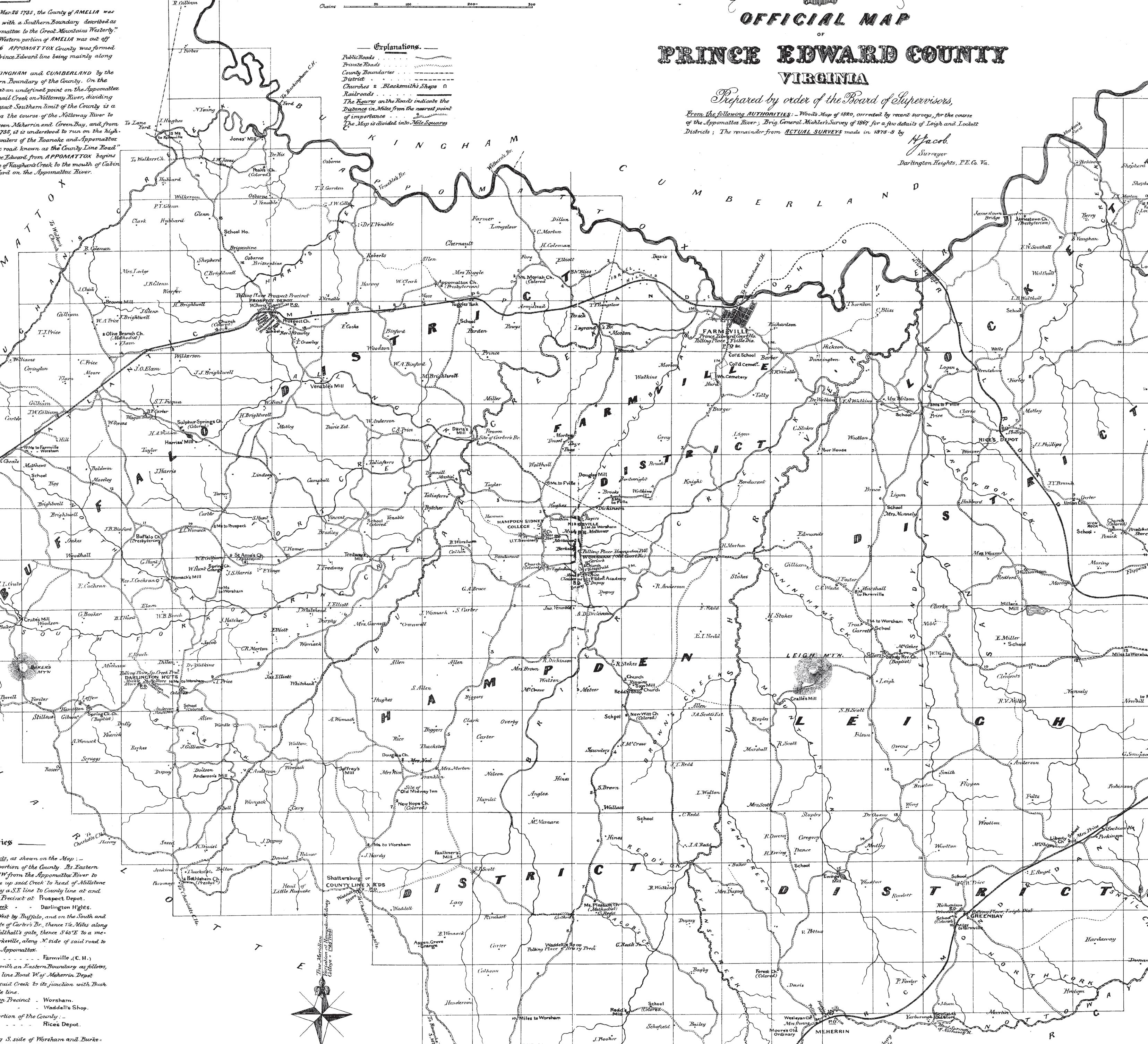
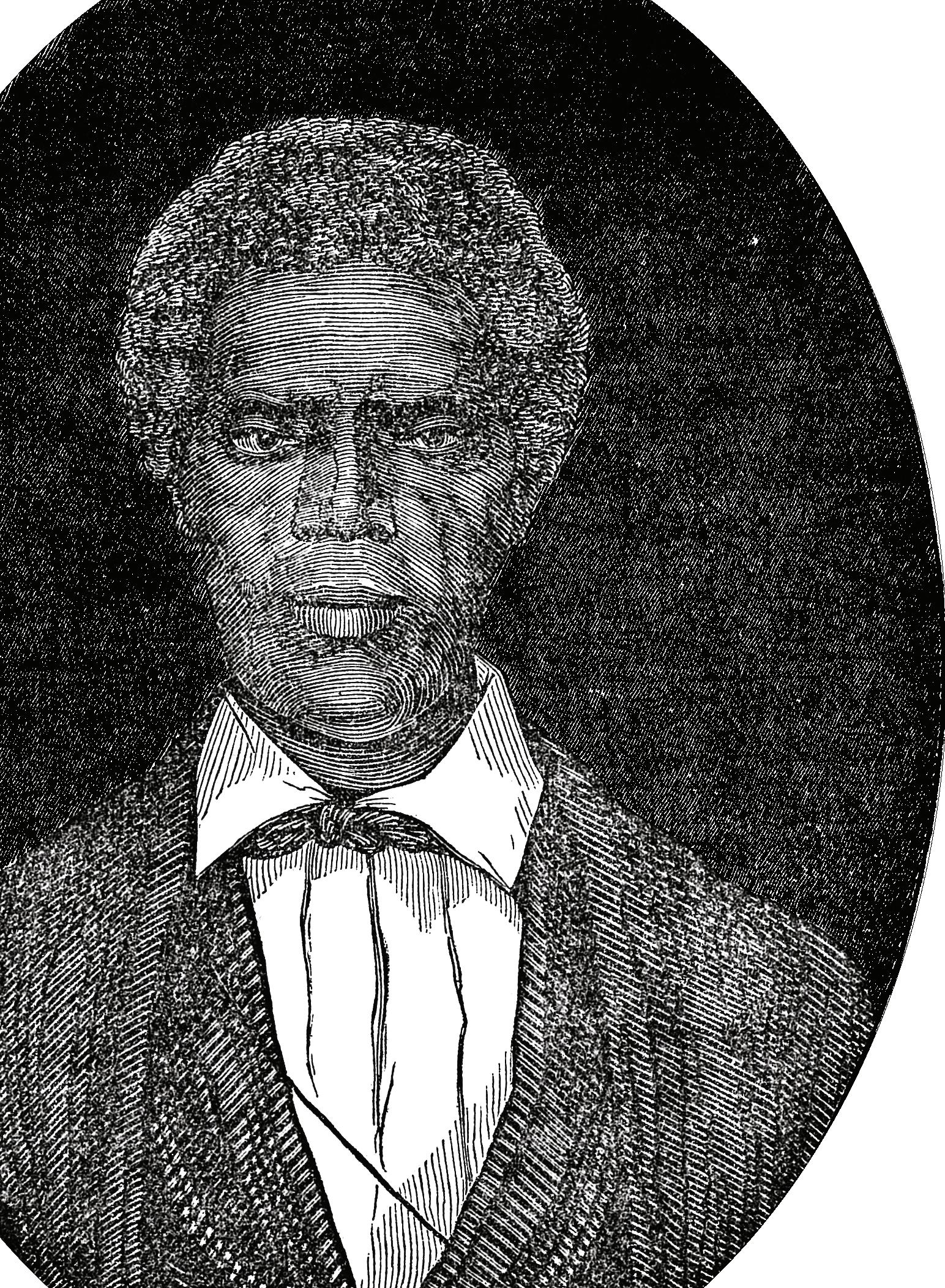
If you’ve shopped outside Richmond in recent years, you may have encountered the bag tax — a small fee that’s become a familiar part of the checkout routine. With City Council’s approval last week, Richmond will join the list next year.
I first encountered the tax in Northern Virginia when a self-checkout kiosk screen asked if I wanted a bag for my items. Normally, that’s a no-brainer— but that extra nickel made me pause. If I carried everything to the register in my arms, I figured I could manage getting to the car the same way — and keep a little extra change in my pocket.
It’s not a major tax, but the potential environmental savings is worth the effort. A nickel is a small price for a cleaner city. Single-use bags often end up littering our streets and waterways, polluting our ecosystems and harming wildlife. They’ve been a problem for years, and we’re glad to see Richmond joining the communities taking action.
We also see the other side of the issue. In many African American households, plastic grocery bags are more than single-use items. They line trash cans, carry lunches, transport homemade plates from church cookouts and store memories in hall closets. They are woven into the fabric of daily life. To toss one away thoughtlessly would be, for some, a waste.
That instinct — to save, to reuse, to stretch the value of something small — isn’t frugality. It’s survival. It’s the product of generations who were taught to make a dollar out of 15 cents, because often that’s all there was. When you’ve inherited that mindset, it’s hard to see a plastic bag as trash. It’s a tool. A resource. A backup plan.
We understand the bag tax is supposed to reduce litter and there’s a real environmental cost to our disposable culture. But who’s being asked to carry the weight of that problem? It’s not the corporations that shrink-wrap the things we buy and flood the market with single-use plastics. It’s the elder on a fixed income who walks to Family Dollar and doesn’t own a car — or a canvas tote.
Back in 2023, a group in California called the Responsible Recycling Alliance raised similar concerns, warning that new bag tax legislation would disproportionately hurt Hispanic and Black families. They weren’t alone. Economists and social advocates alike have pointed out that so-called “sin taxes” often hit the poorest the hardest—even when the intention is good.
Richmond’s council members say the funds will help distribute reusable bags to those who need them most and that’s a start.
If we’re serious about protecting the planet, we also need to protect the people who’ve been doing their part all along—quietly recycling, reusing and passing on wisdom about waste not, want not and what not. Richmond needs to make sure this tax works for the people who’ve been living sustainably long before it was trendy.
There’s a moment in time for politicians and other people in the public eye when they discover their position has diminished. They may hold the same job, retain much of the intellect and talent that got them there, but along the way something shifts – and they realize they don’t have the same degree of influence they’ve been accustomed to.
For our governor, Glenn A. Youngkin, it may have begun with a problem with one his appointees to the governing board of the University of Virginia, Bert Ellis. He was an alumni of the school and appeared to be politically and ideologically aligned with the state’s leader. But, Ellis, some would say, had a habit of saying the quiet part out loud, and his outspoken nature led the governor to ask him to resign in March. Ellis refused. (He was later removed and replaced.)
In April, the governor asked one of his party’s candidates for lieutenant governor to step down. He cited allegedly explicit posts on a social media account as a reason. The candidate, John Reid, also refused. His decision to stay in the race was supported by the current lieutenant governor, Winsome Earle Sears, asserting her role as the de facto leader of the party.
This week, the Senate Privileges and Elections Committee rejected several of the governor’s appointments to the Boards of Visitors, the group that oversees Virginia’s public colleges and universities. Democrats on the committee weren’t impressed with his picks.
In a letter to the Rectors of the Board of Visitors for every public university in Virginia and the Virginia Community College, stated they “will not confirm individuals who do not possess the judgment, character, or willingness to follow the principles articulated in this letter.”
Like a duck whose quacking grows fainter as it drifts downstream, Youngkin’s voice carries less weight than it once did. In politics, as in nature, the loss of influence can be a gradual thing – until it becomes impossible to ignore.

“We want to give every child a place to grow and learn—a chance to be proud of themselves and their country.”
– President Lyndon B. Johnson, on launching Job Corps in 1964
A war has been declared on our young people. Government funding for protections against epidemics has been stripped from the Centers for Disease Control and Prevention and the Department of Health and Human Services. Institutions of higher education are on pins and needles as National Institutes of Health funding cuts threaten their operations and their ability to retain faculty and staff. The U.S. Department of Education is actively undermining public schools’ ability to build inclusive, diverse teaching workforces that reflect the rich fabric of this nation. But the latest inhumane as-

sault is the decision to shutter a nearly 60-year-old federal program designed to house, train and empower the most vulnerable young Americans: Job Corps. Since its founding in 1964 as part of President Lyndon B. Johnson’s War on Poverty, Job Corps has served more than 2 million young people ages 16 to 24. The program provides free education and vocational
training, safe housing, meals, counseling and job placement support. It has long been a beacon of hope for youths disconnected from school and work—offering not just opportunity, but dignity and direction. That beacon is now being extinguished.
Last week, the Trump administration directed the Department of Labor to halt new student enrollments and begin the process of shutting down Job Corps centers across the country. The decision is both abrupt and devastating. Students—many
of whom are housing insecure, survivors of trauma or aging out of foster care—are being cast out with no warning, no alternatives and nowhere to go.
Centers in communities from Alaska to Alabama have begun closing their doors. Students have been sent away midtraining, with no guarantees of completion or transition support. For many, Job Corps was not just a lifeline—it was the only line.
Let’s be clear: This is not about fiscal responsibility. Job Corps has long enjoyed bipartisan support because of its proven impact. According to the Department of Labor’s own data, Job Corps participants are more likely to be employed, earn higher wages and less likely to commit crimes. The program returns more than $2 for every taxpayer dollar invested.
Ending it is not just shortsighted. It is immoral. And it is un-American. A nation that claims to believe in liberty and justice for all does not shut the door on youths seeking a second
For those who think government should be run like a business, the messy social media spat that played out last week between President Donald Trump and billionaire CEO Elon Musk suggested business could be doing a lot better.
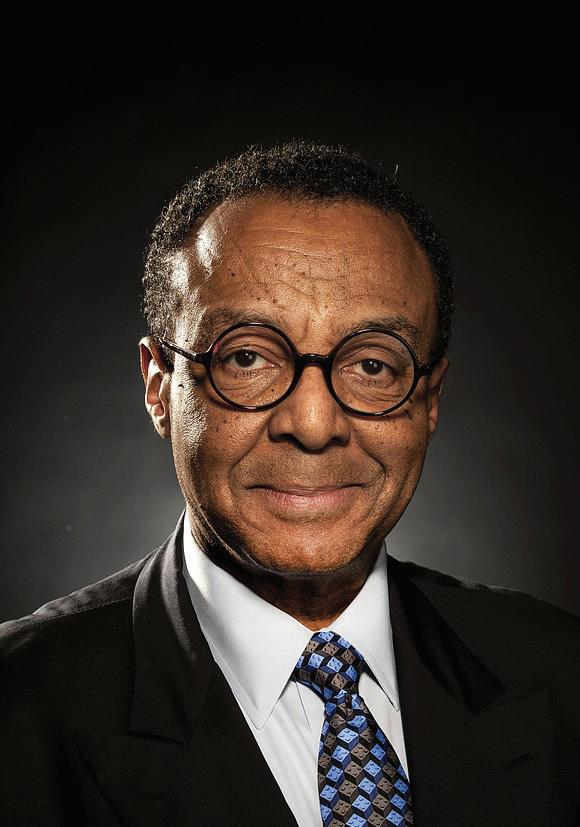
That may help explain why shares of Musk’s com pany Tesla dropped 14% Thursday, falling for the second straight day as the spat between the richest man in the world and the most powerful man in the world oozed into a meltdown.
Ironically, the fight played out on the social media platforms Truth Social, majorityowned by the president, and X, formerly Twitter, which Musk bought and renamed in 2023 and subsequently turned into a megaphone for far-right politics and Trumpism.
To many observers, the breakup of this bromance seemed inevitable, less because of the bros’ differences than the great deal they share in common.
“Like ‘Alien v. Predator’ for political nerds,” The Guardian ballyhooed — and, as a dedicated political nerd, I agree. What else can we expect from two megalomaniacs dedicated to fame, money and far-right politics and experienced with messy divorces?
“I suppose it was in the stars,” Rep. Jamie Raskin, of Maryland and top Democrat on the House Judiciary Committee, told reporters on Capitol Hill. “Everybody was predicting it when it first began. You’ve got two gentlemen with gargantuan
egos and both appearing to suffer from malignant narcissistic personality disorder.”
Ah, how far the oligarchic dream team has tumbled since Trump and Musk joined forces to wage war against what Musk branded “the woke mind virus” — and of course to pursue riches through tribute (Trump) and government
contracts (Musk).
The table for the breakup was set in late May when the U.S. House of Representatives narrowly passed Trump’s One Big Beautiful Bill Act, a domestic policy spending bill, which among other things would eliminate subsidies for electric vehicles such as those Tesla makes.
Musk began grousing about the bill early last week, but he mostly confined his criticism to the amount by which the bill would increase the deficit.
Trouble began in earnest Thursday while Trump was meeting in the Oval Office with Chancellor Friedrich Merz of Germany. A reporter asked Trump about Musk’s criticism of the bill. Trump pointedly referred to the relationship in the past tense and cast doubts on its happy future.
Musk later slipped in a jab, suggesting that Trump and the Republicans could never have prevailed in last year’s elections without the $288 million that Musk spent to put them over the top. “Such ingratitude,” he huffed.
The exchange became more heated as Musk lashed the legislation as a “disgusting abomination” that would bankrupt the country. He then rallied his online followers to “Kill the
Bill” and things only got nastier.
Among the highlights — and lowlights — Musk accused Trump of keeping the company of a pedophile.
“Time to drop the really big bomb,” Musk tweeted. “@realDonaldTrump is in the Epstein files. That’s the real reason they have not been made public. Have a nice day, DJT!”
The reference is to the late registered sex offender Jeffrey Epstein, who can be seen in widely circulated video partying with Trump.
Musk later replied “Yes” to a post that suggested Trump should be impeached and replaced with Vice President JD Vance.
By Thursday afternoon, White House staff were calling the fracas “the one big, beautiful breakup,” a reference to the legislation that ignited Musk’s fury.
That led to more speculation and debate as to where the feud would go next. Would it disrupt serious legislation? Who was winning the public relations battle on an ever-shifting playing field?
A poll taken by YouGov asked respondents whose side they were on in the feud and found 52% said, perhaps sensibly, neither one. Only 28% picked Trump and a meager 8%, perhaps tech bros, picked Musk.
Frankly, in a country loaded with people who have serious concerns about government and feel weary over such shenanigans, I hear a message in the polls: Make it stop!
What happened to all the people who say government should be run like a business?
The answer I hear is another question: Whose business?
The writer is columnist at the Chicago Tribune.
chance. A country that prides itself on being the land of opportunity does not abandon its young people to the streets. The dismantling of Job Corps is not just a policy choice—it is a betrayal. We must fight back. The National Urban League stands in fierce opposition to the shutdown of Job Corps. We call on Congress to intervene immediately to restore funding, halt center closures and protect the future of our young people. We urge mayors, governors, educators, civil rights leaders, and everyday citizens to raise their voices and demand justice. To harm our youths is to harm the soul of this nation. And we refuse to be silent as our future is left to fend for itself. The writer is the President and CEO of the National Urban League.
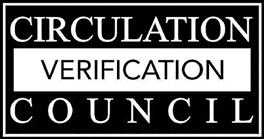



My grandmother taught me we are all born into a great, unfinished struggle. She meant the struggle for justice. For truth. For dignity.
Next week is Juneteenth, a time of year I always think about this lesson. I think about all the freedom fighters — famous and forgotten — who walked before us. And I think about all of us who walk now, still trying to finish what they began.
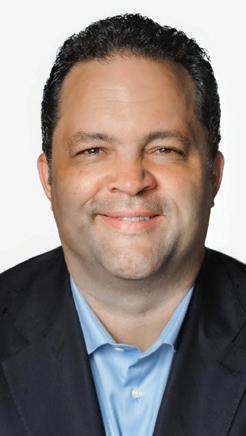
Juneteenth is not just about the day the last enslaved people in Texas finally learned they were free — two and a half years after the Emancipation Proclamation. It is about the delay. The gap between law and justice. It is about how long freedom takes when you leave it up to power.
But most of all, Juneteenth is about the power and importance of truth.
In every generation, there are people who want to bury the truth. We are living through one of those times right now.
Recently, I wrote about how the Trump administration’s attempts to omit Black heroes and accomplishments from the
American story — as well as those from other marginalized groups — in its scorched-earth assault on diversity, equity and inclusion.
As we fight the erasure of important heroes and history makers from our past, there are pathbreaking heroes of today’s generations who have been targeted. I was recently reminded of this by Maj. Elizabeth Stephens.
“There’s a lot of focus on dead people, but a lot of us are still
here,” Maj. Stephens told me. “People don’t understand what it’s like to watch yourself be erased, watch your achievements invalidated and the recognition you’ve received for those achievements taken away.”
Among her many distinctions, Maj. Stephens was the first Black female graduate of the U.S. Naval Academy to be selected as a naval aviator in the Marine Corps. She was the first Black woman to pilot the CH-46E and the first woman to pilot the MV-22 Osprey. For years, pictures of her and commemorations of these groundbreaking accomplishments were regular features in government buildings, naval events and on
military websites.
Now, just because she is a Black woman, her image and achievements are being swept into the dustbin, along with many other notable examples of Black heroism, as part of the Trump administration’s “DEI purge.”
Indeed, if you Google Elizabeth Okoreeh-Baah — Maj. Stephens’s name at the time she served — one of the top results is a link to the U.S. Department of Defense for a photo titled “Osprey Pilot” with the description, “Marine Corps Capt. Elizabeth A. Okoreeh-Baah, the first female MV-22 Osprey pilot, stands on a flightline in Iraq after a combat operation, March 12, 2008.” However, click the link and you end up on a defense. gov page with the error message “404 - Page Not Found.”
At least this was the situation last Friday when I checked. I searched her name on defense. gov just in case the page was moved. No results.
Burying the achievements and contributions of our heroes rewrites history to fit a warped narrative of America that serves no one. What does serve all our interests is remembering.
And, on Juneteenth especially, that includes remembering not only that historical nail in slavery’s coffin, but the people, places and events that
I recently attended the open house of the Historic Chatsworth School in the Varina area of Henrico County. The open house was highlighted in the [Free Press May 22-25 edition]. I was treated to an excellent tour and an even better conversation with docent Stephanie Bell, a volunteer and member of Antioch Baptist Church. Antioch Baptist Church has masterfully restored and preserved a piece of history that anyone can tour if able to do so. There is no admission charge and the school is wheelchair accessible. It is my hope that area schools and the general public will take advantage of the opportunity to view and learn about a period of history that illustrates the challenges and the triumphs of this community and others like it. It is a real treasure. It can be viewed by appointment by contact -

ing chatsworthschoolvarina@ gmail.com. My thanks to the Free Press for printing that article and promoting the awareness of this
Once again, the Richmond powers have chosen to monetize a problem instead of solve it. And, of course, it’s us, the consumers, whose pockets are rifled. So we pay 5 cents for a plastic bag, and the city and the store divvy it up between each other. Where in that process is the disincentive of the stores to stop using plastic bags? Nowhere.
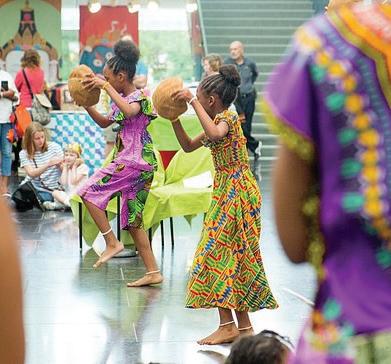
were part of the long fight to end that abhorrent institution.
Remembering Harriet Tubman was not only the most famous conductor of the Underground Railroad but a nurse and a spy for the Union Army and the first woman in U.S. history to lead a military raid. That raid — at Combahee Ferry in South Carolina — freed more than 700 people in a single night.
Remembering Black churches like Quinn Chapel AME — the oldest Black church in Chicago — and Pilgrim Baptist in St. Paul were not just places of worship. They were stations on the railroad to freedom.
Remembering the story of Joshua Glover — a man who escaped slavery in Missouri, was captured in Wisconsin under the Fugitive Slave Act, and then liberated from jail by a crowd of thousands of abolitionists. His rescue helped spark the creation of the Republican Party — back when it was the party of Lincoln.
These are not footnotes. They are the foundation. They tell us something essential about who we have been, who
important resource and historic structure.
NELSON CALISCH Richmond
The creation of the recycling industry did nothing to stop the creation of trash; it just put the onus on those who have little to no choice but to pay for it and drag it out to the curb at the end of the week. To stop the use of plastic bags, make them illegal. That. Simple. It won’t make the city any money (directly), but it will actually clean up the city. Stop punishing us for industry’s callous carelessness with your own greed.
DION BURN Richmond
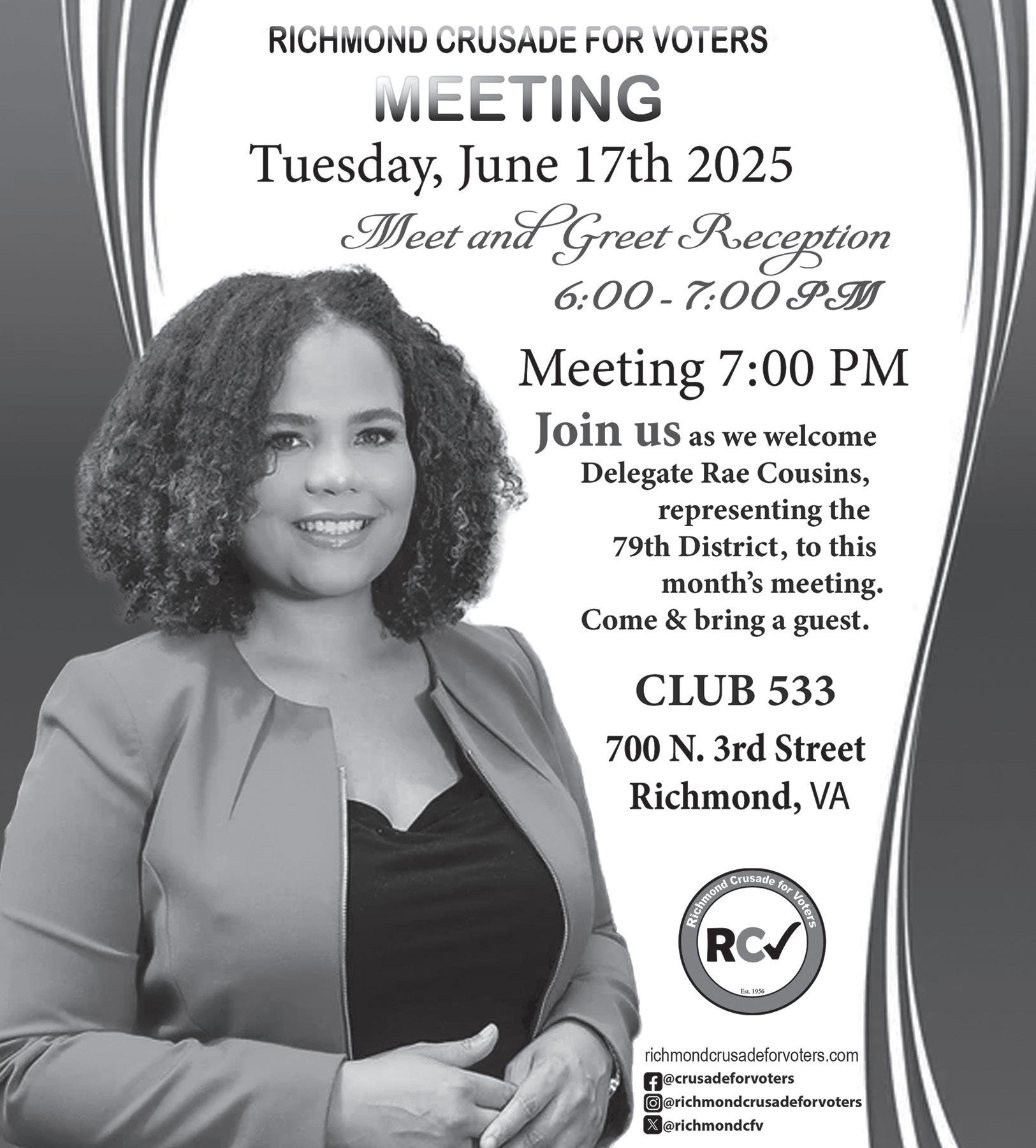
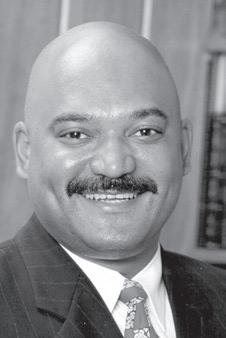
we are and who we can still be. Now, as the Trump administration attacks anything and everything recognizing diversity, as it moves to gut staff and resources from the very departments tasked with preserving our
history, we need to be worried. We need to be worried about the future of sites that are part of the National Park Service’s Underground Railroad Network to Freedom program. The battle to preserve our history — including the history still being made today — is not separate from the fight for our future. What we remember shapes what we do. When we tell the stories of the people who fought for freedom, we see ourselves in them — and find the courage to keep going. Juneteenth is about facing the hardest parts of our past without flinching and celebrating the progress we have made. It is about believing that America can still become the country it claims to be. That belief is what sustained my grandmother. It is what fuels me. And it can be a source of hope for all of us. The writer is the executive director of the Sierra Club and a professor of practice at the University of Pennsylvania.
Paid Advertisement
Bridging the Retirement Divide:
Enhancing the 401(k) System for Equity and Security
Retirement security is a fundamental aspiration for Americans, and employerbased plans like 401(k)s are helping millions reach that goal. Yet, for many women and people of
African American blood donations are best for these patients.
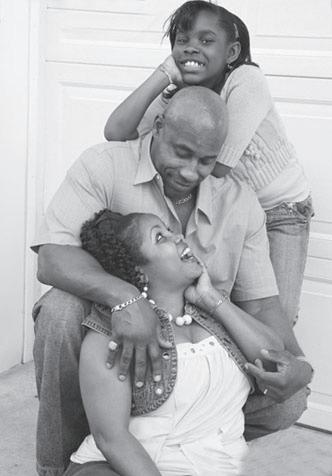


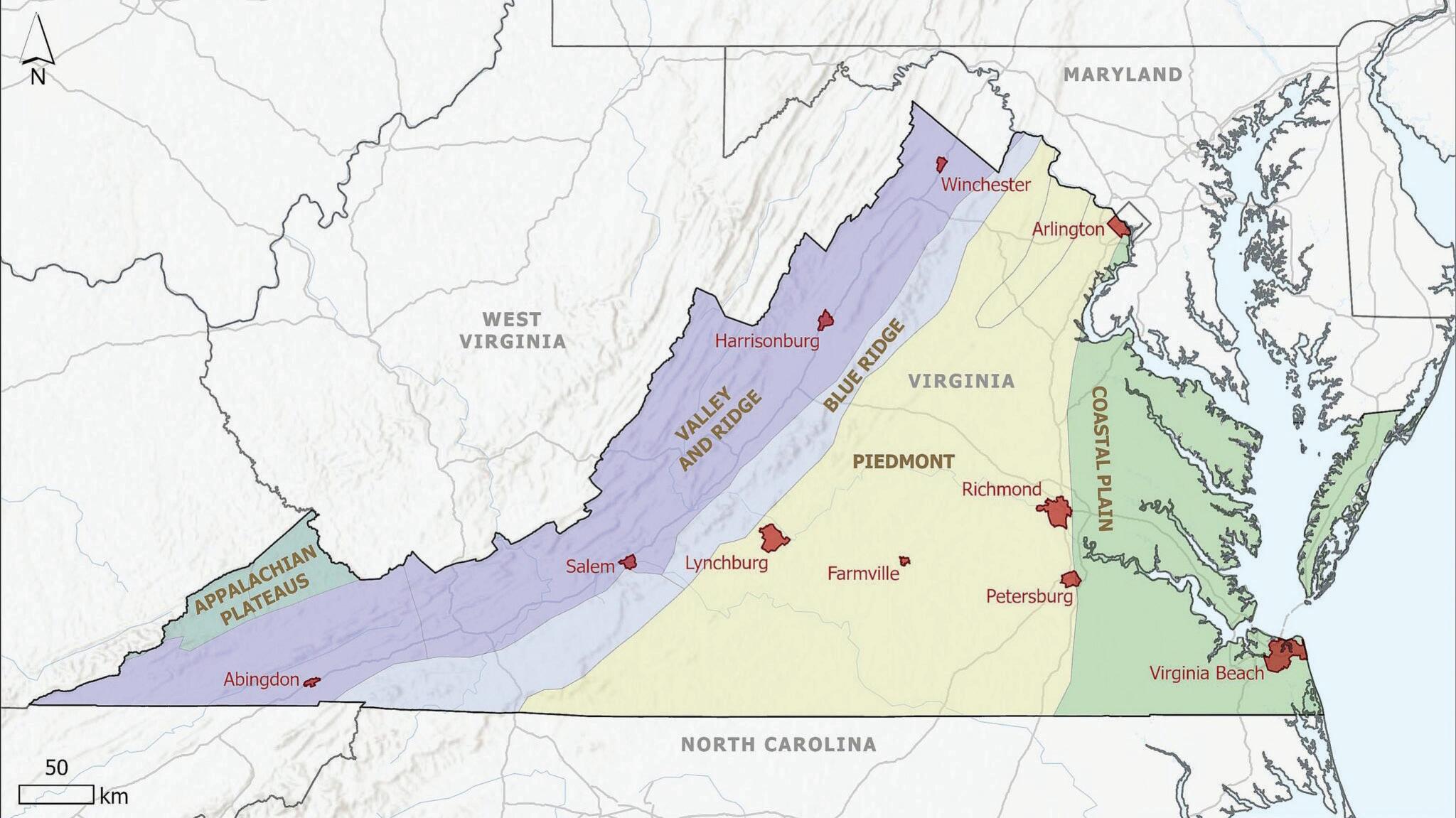
By Shannon Hekt
As hot and humid summer weather settles across Virginia, a recent study finds that certain neighborhoods across the state, often with higher populations of people of color, can be up to 15 degrees hotter than other areas. The research cites extreme heat as the cause of “more fatalities in the United States than any other weather phenomenon.”
“There are differences in all of those municipalities in who is experiencing this heat, and usually it’s the neighborhoods that are least prepared to deal with it, have the poorest kind of infrastructure setup, such as air conditioning units and cooling centers,” said Todd Lookingbill, a professor of geology, environment and sustainability at the University of Richmond.
On a hot summer day in July 2021, over 200 volunteers with the study collected air temperature data in Arlington, Richmond, Lynchburg, Harrisonburg, Virginia Beach, Winchester, Farmville, Petersburg, Salem and Abingdon. The areas of these towns that were the hottest had low tree cover and expansive concrete spaces that correlated with parts of town that had been historically underinvested, in part due to redlining practices.
In some of the cities that did not have large populations of people of color, other factors such as unemployment and education were common indicators in the areas that were found to be the hottest.
The Virginia Heat Watch initiative included researchers from 12 universities and colleges from all reaches of the state. The volunteers collected hundreds of thousands of temperature readings in one day.
The study also found that the hot spot neigh-
borhoods often have high populations of people with health vulnerabilities that make high heat a major risk factor. Exposure can lead to feedback loops of poor health and an inability to work.
“One of the things that’s really interesting in that regard is bus stops. In these kinds of areas, people tend to take more public transportation,” Lookingbill said. “We found that a lot of those bus stops are areas that are uncovered and don’t have a lot of tree cover or artificial bus stop cover.”
Some of the cities are taking proactive steps to make tree cover and other cooling techniques a priority in their city planning. Richmond has ideas for the expansion of green space and incentives for developers to keep or plant trees in the Richmond 300 master plan.
The Virginia Department of Forestry helped fund this study as part of their outreach to communities about their tree canopy mapping service. Communities can apply for grants to have the maps made, which will often line up with the hotspot data from the study.
“If we can get the word out that these programs exist, you know, local people who are aware of the issues that they face, they can reach out to us and have us come and assist. There are programs out there. We would just like people who need them to participate in them,” said Molly O’Liddy, urban and community forestry coordinator with the Virginia Department of Forestry.
O’Liddy said that the department is focused on not just urban areas in the largest cities. They also want to reach the smaller communities to show them where green space can help cool things down in parking lots, on sidewalks, or other areas of town.
This story originally appeared at VirginaMercury.com.

Having high blood pressure can lead to hear t disease and stroke, but it can be managed through simple lifestyle changes or medication. The best way to know if you have healthy blood pressure is to have it checked by a health care professional .
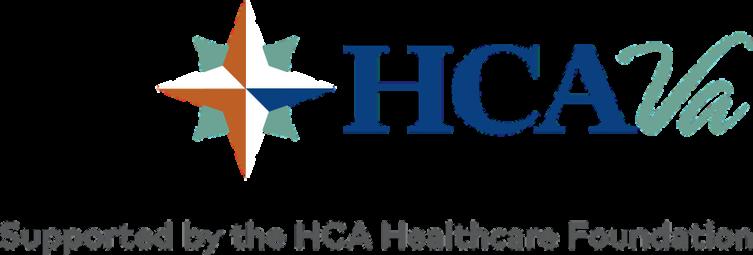

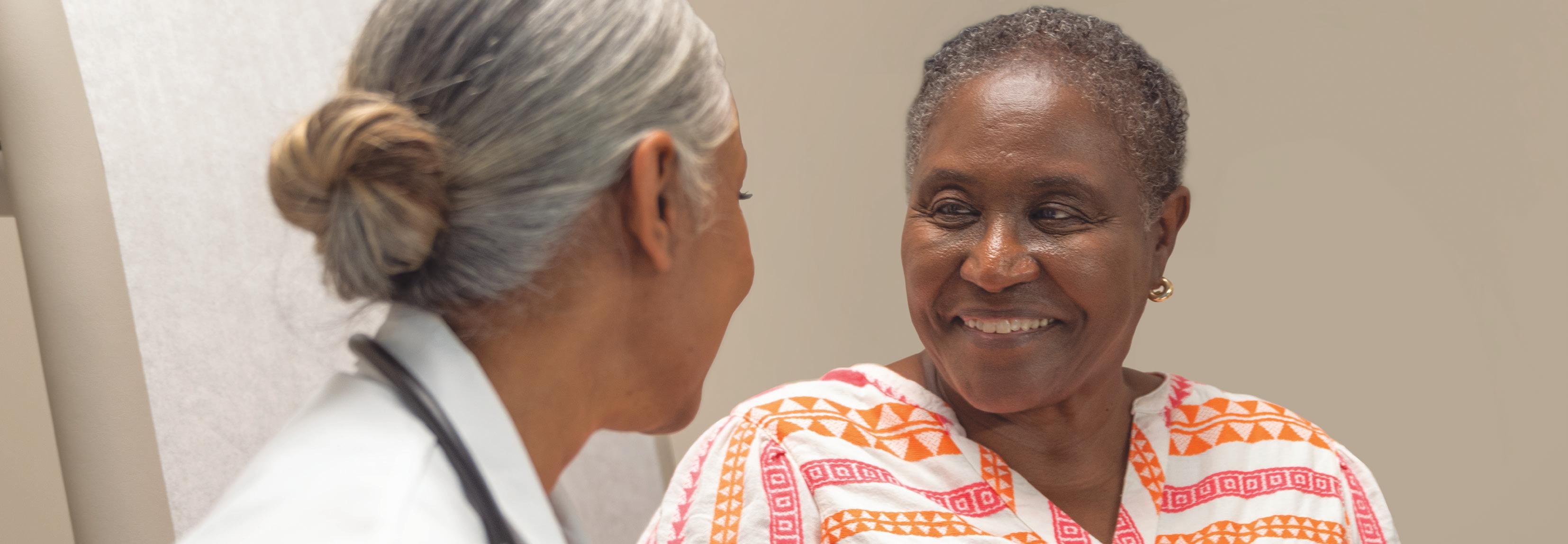



Free Press staff report
Norfolk State University and Duke University have finalized a home-and-home women’s basketball series set to take place over the next two seasons, the schools announced.
Norfolk State will travel to Cameron Indoor Stadium on Nov. 12. Duke is scheduled to visit Echols Hall during the 2026-27 season, marking the program’s first appearance in Norfolk. Tipoff times for both games will be announced later.
The matchup marks the second meeting between the two programs. Duke won the previous contest 95-48 in the first round of the 2002 NCAA Tournament, following Norfolk State’s first Mid-Eastern Athletic Conference (MEAC) tournament title.
The game at Echols Hall will be the first time a member of the Atlantic Coast Conference has played on Norfolk State’s home court in women’s basketball.
Duke ended the 2024-25 season with a 29-8 record and reached the Elite Eight of the NCAA Tournament, finishing the year ranked No. 7 in the country.
Norfolk State recently won its third consecutive MEAC Tournament Championship and earned a No. 13 seed in the 2025 NCAA Tournament, the highest seeding in program history.

Free Press staff report

Peter Moylan once arrived in Richmond as an unknown Australian reliever with a rebuilt career and a revived fastball. On Thursday, June 12, he’ll return as a celebrated major league veteran, signing autographs and throwing the ceremonial first pitch where part of his improbable journey took shape — The Diamond.
The former Richmond Braves pitcher will be the featured guest during the Flying Squirrels’ “2000s Night,” part of the team’s “Diamond Through the Decades” series honoring 40 years of baseball at The Diamond and 15 seasons of Flying Squirrels baseball. Moylan, who pitched in parts of two seasons with the R-Braves and later spent 12 seasons in the majors with Atlanta, Kansas City and the Los Angeles Dodgers, will meet fans on the main concourse from 6:45 to 7:45 p.m. following his first-pitch appearance.
“Of all the players who have come through The Diamond in the ballpark’s 40-year history, Peter Moylan’s story is arguably one of the best,” Flying Squirrels General Manager Anthony Oppermann said. “Richmond was part of his journey to a prolonged major league career, and we’re excited to welcome him back.”

Originally signed by the Minnesota Twins in 1996, Moylan stepped away from the game for several years, working as a pharmaceutical sales rep and managing a club team in Australia. When injuries sidelined pitchers on his team, Moylan returned to the mound and saw his fastball velocity climb to the mid-90s.
That late-career boost earned him a spot on Australia’s roster for the 2006 World Baseball Classic, where his performance against Venezuela caught the attention of major league scouts. He signed with the Braves that year, nine years after his last appearance in affiliated ball.
After a brief stop in Richmond, Moylan made his MLB debut in April 2006, pitching a scoreless inning against the Phillies. He returned to the R-Braves later that season and again in 2007 before earning a full-time spot in the Atlanta bullpen.
In his big league career, Moylan became a fan favorite, going 24-10 with a 3.10 ERA across 399 appearances. He has since worked as a coach, broadcaster and podcaster.
The June 12 game also includes a diamond ring giveaway for the first 2,000 fans, courtesy of Dominion Energy. The Flying Squirrels will wear special “Richmond Professional Baseball” jerseys, honoring the franchise’s early days before the Flying Squirrels name was adopted in 2009.
Free Press staff report
Live thoroughbred racing returns to Colonial Downs next month, following a record-setting spring meet that saw more than 8,000 fans witness American Promise win the Virginia Derby and earn a spot in this year’s Kentucky Derby.
The 2025 summer meet will feature 44 race days, the most since the New Kent track reopened in 2019. The expanded schedule adds 17 days to last year’s season and will run from Wednesday, July 9, through Saturday, Sept. 13, with racing every Wednesday through Saturday and a special Labor Day card on Monday, Sept. 1.
Post times will vary, with most days starting at 12:30 p.m. and Friday cards beginning at 4 p.m. Colonial Downs also will host steeplechase races on select Thursdays—July 10, 17 and 31; Aug. 7 and 21; and Sept. 4 and 11 — with a first post of 10:45 a.m. Wagering on these events will be available on-site only.
“The 2025 race season began with the landmark Virginia Derby—the first-ever Kentucky Derby qualifier held in the Commonwealth—and continues all summer long with exciting racing, live music, great food and drinks, and a few new surprises we think fans will love,” said Frank Hopf, senior director of racing operations.
This year’s schedule includes four Premium Racing Events. Opening Friday on July 11 will feature the return of the camel, ostrich and zebra races between thoroughbred contests. The Colonial Downs Festival of Racing on Aug. 9 will include some of the summer’s biggest purses with the Grade 1 Arlington Million, Grade 2 Beverly D., and Grade 2 Secretariat Stakes. The event will feature a special noon post time and a live performance by “American Idol” finalist Grayson Torrence, a native of New Kent County. On Aug. 23, Wiener Dog Racing returns to the track as dachshunds compete in short sprints for cheering fans. Old Dominion Day on Sept. 6 will include the Grade 3 $500,000 Old Dominion Derby and the $250,000 Old Dominion Oaks, with live music from The Deloreans. Post time is scheduled for noon.
General admission will be free on most race days. Premium event days will require a $5 ticket, with free entry for children age 5 and under. Saturdays will feature family activities like pony rides and petting zoos, along with themed events such as RVA Day on July 12, PDJF Day on July 26, and College Day on Sept. 13.
More information is available at colonialdowns.com.

the
time of 1:46.41 for the 1 1/8-mile race.
Richmond football unveils 2025 home schedule as new Patriot League era begins
Free Press staff report
The University of Richmond football team will usher in a new era this fall as it makes its debut in the Patriot League, highlighted by a five-game home schedule at Robins Stadium.
All home games will kick off at 2 p.m., with a focus on offering fans a daylong experience filled with football, family-friendly activities, and community engagement. Season and single-game tickets, as well as parking passes and Spider Brews tickets for select games, are now on sale.
The Spiders will open their 2025 home schedule Sept. 20 against Virginia Military Institute. The game will feature the
unveiling of the 2024 CAA Championship sign, recognition of Richmond’s 2024-25 conference championship teams, and a Spider Kids Club event with activities for young fans. The pregame Spider Brews event also returns in the Front Forest.
The following Saturday, Sept. 27, Richmond hosts Howard for Family Weekend. Festivities will include a food truck rodeo on Lessing Plaza, the team’s Mental Health Awareness Game, and the annual Spiders Vote initiative promoting civic engagement.
Homecoming is set for Oct. 18 when Richmond welcomes Holy Cross for its first-ever Patriot League home game. All attendees will be asked to wear red as part of a “Red Out Robins” initiative. The 2025 Hall of Fame class will be recognized at halftime.
The Nov. 1 matchup against Fordham will serve as the Fall Festival Game. Attractions include an inflatable corn maze, pumpkin patch, youth football and cheer day, faculty and staff appreciation, and seasonal contests. Richmond will close its home slate Nov. 15 against Lafayette. The day will feature a pregame skydiver delivering the game ball, Hero Appreciation Day, and tributes to senior players. Fans can also enjoy Spider Brews, a rock climbing wall, and a Touch-ATruck display as part of Season Ticket Holder Appreciation Day. Tickets for Richmond’s Sept. 13 road game at North Carolina also are available. For more information or to purchase, call 1-877-Spider-1.
Clara Adams, a sophomore high school sprinter in California, had a rule change after winning a preliminary heat in the girls’ 400 meters in a CIF State Track and Field Championship meet. There’s no doubt she won, but her victory was stripped because a rule was made up to disqualify her after she won.
She won the state title and, as anyone would have done, she celebrated her victory — something most winners do. She was stripped of the state title after celebrating. Nobody had ever forbidden the way winners celebrated at her school.
After winning a preliminary heat, she finished first in the finals the next day but was stripped of the title because of
a celebration that was deemed by meet officials to be unsportsmanlike. She had run the fastest in the girls 400-meter finals. She crossed the finish line .28 seconds ahead of her closest rival. That was cause for celebration, so she did what most winners do. She celebrated using a small fire extinguisher to spray her cleats—something her father gave her after the event was over. The crowd loved it, but her action was deemed unsportsmanlike. She was stripped

of her title and not allowed to compete further because officials who were no longer in charge of the track meet, once it was over, decided to make an after-game ruling without an appeal of a non-existing rule. The race was over. Clara had walked back in front of
E. Faye Williams
the stands, found her father, who handed her the small fire extinguisher. She walked back across the track into the grass, where she sprayed her cleats as if she was putting out a fire. Her move was one made as a tribute to former U.S. sprinter Maurice Greene, who similarly
celebrated his win in the 100 at the 2004 Home Depot Invitational. He was celebrated. She was punished. “If the celebration was away (off the track) from everyone and not interfering with anyone, I would say reinstate her,” Greene said. Instead of being the victorious one, Clara was stripped of a title she had won and it was given to someone else. Adams said she was just having fun. The crowd loved her celebration. She had just won her first state title and yes, she was excited, but it was all taken away from her because somebody, after the track meet was over, decided to give her victory to somebody else. Insensitive adults made her
sit and watch others who came in behind her as they accepted what she would’ve received as the victor. Clara meant no harm because no such rule existed. Her win in the 400 marked her first state title and insensitive adults took it away from her. She didn’t do anything wrong. Clara’s father said the officials “were really nasty” toward his daughter. “They tugged on her arm. They were screaming in her face. They had allowed no appeal before taking the title and giving it to the second place winner.” Mr. Adams said, “We were asking for the rule, the specific rule of what she did, and they didn’t really give anything.”
Wouldn’t it be a victory for Adams and Mosby if Mosby presented the award she had not really won to Clara, making both girls winners? It would show the adults who unfairly took Clara’s award the meaning of fairness. Young people have often shown adults what fairness means. Madison Mosby, who was given the award that should have gone to Clara, has a chance now to be a real hero by presenting the award to Clara, the real winner. Both girls would forever be known as winners. Mosby doesn’t have to do it, but it would certainly be a memorable example of justice. The writer is the president of the Dick Gregory Society.



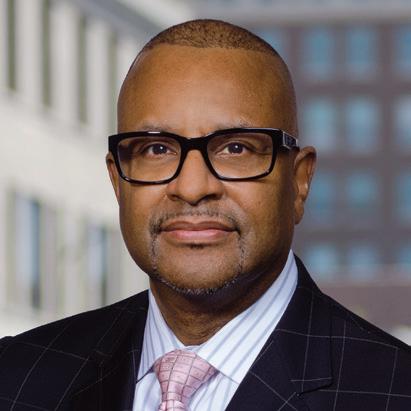





















Armstrong and John Marshall high school’s choral director James Johnson is among 200 quarterfinalists for the Grammy Music Educator Award. The award, presented by the Recording Academy and the Grammy Museum, recognizes educators who have made a significant and lasting contribution to the field of music education. Nominees also must demonstrate a commitment to the broader cause of maintaining music education in schools.
“This national honor is truly humbling, but regardless of the final outcome, I already feel like a winner because I have the privilege to serve in the finest district in Virginia with the most exceptional students in the world,” Johnson said. Johnson, a self-described musician, singer, producer and songwriter, comes from a family rooted in music. His mother serves as the minister of music at their home church in Baltimore, where his father is the pastor. His musical journey has seen him write songs for various television programs and short films, as well as tour with major recording artists, including Nancy Wilson and the R&B group Dru Hill.
The Baltimore native brought his passion for music to Richmond in 2008, when he began teaching at Carver and Bellevue elementary schools. His first year at Armstrong and John Marshall in 2024-25 marked a new chapter for music education.
“It had been three years since Armstrong had a choral program before I got there, and eight for John Marshall,” Johnson said. In addition to contributions to music education, the award celebrates the educators’ impact on the lives of their students.
Growing up in inner-city Baltimore, Johnson lacked exposure beyond his neighborhood. But, discovering music at a young age gave him a foundation for success and opportunities he never thought possible. Those early years inspired him to give back to his community, and he understands how music can lead to possibilities beyond his students’ current situation.
Johnson is on a mission to show his students the many possibilities music can open up, even if it doesn’t lead to a career in music. He firmly believes music education instills essential life skills, and he’s committed to nurturing his students’ potential.
“My students develop discipline and time management through consistent practice, while ensemble work builds collaboration and leadership capabilities,” he said. “I also use music as a bridge to enhance performance in math, reading, and critical thinking.”
Fifteen semifinalists for the Grammy Music Educator Award will be announced in September and receive a $500 honorarium and matching school grants. The nine finalists will receive a $1,000 honorarium, as well as matching grants for their schools. The winner will be honored during Grammy Week in Los Angeles and receive a custom award and a $10,000 honorarium.
When did you begin teaching?
I’ve been teaching since 2002. I started in the Baltimore Public Schools and moved to Richmond in 2008.
Where do you live now? Hanover.
What’s your educational background?
I just completed my master’s in divinity from Virginia Union
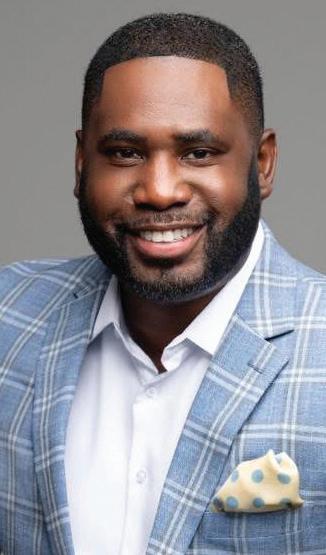
University, and I’m working on a doctoral degree. I have a bachelor’s in jazz studies from Peabody Institute of The Johns Hopkins University; a master’s in education from Virginia State University; a master’s in music business from Berklee College of Music; and an MBA from Boston University.
How were you notified about the award nomination?
I was notified via email, inviting me to fill out an application.
How does it feel to be nominated?
It’s amazing! I serve in education and music to give back to the community, so to be recognized for what I do is humbling. I am grateful for all the support and the ability to serve at the two high schools I love so dearly, Armstrong and John Marshall.
What is the Grammy Music Educator Award?
The Music Educator Award recognizes current educators, kindergarten through college
and public and private schools, who have made a significant and lasting contribution to the field of music education and who demonstrate a commitment to the broader cause of maintaining music education in the schools.
The Music Educator Award program, including honorariums, is made possible by the generosity and support of the Chuck Lorre Family Foundation. In addition, the American Choral Directors Association, National Association for Music Education, NAMM Foundation, and National Education Association support this program through outreach to their constituencies.
Why were you nominated?
Who nominated you?
I don’t know who nominated me or why. I try very hard every day to expose my students to opportunities where music can take them, including college, because music was an opportunity to see beyond my neighborhood.
What do you love most about teaching music?
I love watching my students grow. I see where they start and where they end up. I’m not just teaching music. I want to see them grow scholastically and as a person.
Why is it important to have music programs in public schools?
Music education isn’t just about musical theory. It has unlimited potential to teach students life skills. I bring the two schools together to form a single choir. That requires them to learn teamwork, collective responsibility, inclusivity and social skills. It builds confidence. They
also learn about goal setting, critical thinking, math, time management and leadership.
Tell me about today’s students and their interest in music.
I meet my students where they are musically. I grew up learning classical music and I teach the students about the parallels between today’s music and the music of the past. It’s all about exposure and appreciation. I have a great group of kids.
What musical instruments do you play?
I’m a percussionist and I play the piano, organ and guitar.
Do you perform locally?
Yes, locally and nationally.
What sparked your love of music?
I’m from a family of musicians. We have a huge musical family, so I grew up with it.
Who are some of your favorite recording artists?
Quincy Jones is my favorite. He’s one of my top influences. I love everything that he’s done as a producer, arranger and songwriter. I’m also influenced by Stevie Wonder, Prince and Ella Fitzgerald. What hobbies do you have?
I like to cook. I do a lot of seafood because I’m from Baltimore. I also bake, and my favorites are pound cake and sweet potato pie. Does Richmond have a good crab cake?
I will not eat a Richmond crab cake, no offense. It’s just not Baltimore. There’s nothing like a Baltimore crab cake. The first thing I do when I go home is get crab cakes.
What do you think about the Allianz Amphitheater? Richmond needs a venue like that to attract artists. When artists come to Virginia, they typically play larger venues in Hampton Roads or Washington,
D.C. I think it’s a great thing for the city.
What do you do in your spare time?
I’m very involved in church. I serve in a church in Loudoun County. I’m also the minister of music at Cedar Street Baptist Church, so I don’t have a lot of spare time. When I do, I like movies, going to the gym, writing and spending time with my family.
How do you start your day?
I get up in the morning around 4:45 a.m. to go to the gym. What are three words that describe who you are? Passion, dedication and creativity.
Who is your dream dinner party guest?
Miles Davis, because he significantly changed the scope of how music can be appreciated. He’s in his own world on stage. What’s your favorite quote?
“Everybody, no matter what vocation they’re looking at, should add music as an essential to their curriculum” by Quincy Jones. What book influenced you the most and how?
James Baldwin’s “The Fire Next Time.” His strategies for understanding how African Americans are viewed in society and the opportunities to build wealth and strive for excellence. What are you reading now?
I’m reading “Learning from the Giants: Life and Leadership Lessons from the Bible” by John Maxwell.
If you win, who will you take to L.A. with you?
I don’t know. I don’t want to reveal that just yet.
What’s your next goal? I want to see my children grow into their fullest versions and complete my doctoral program in theology.
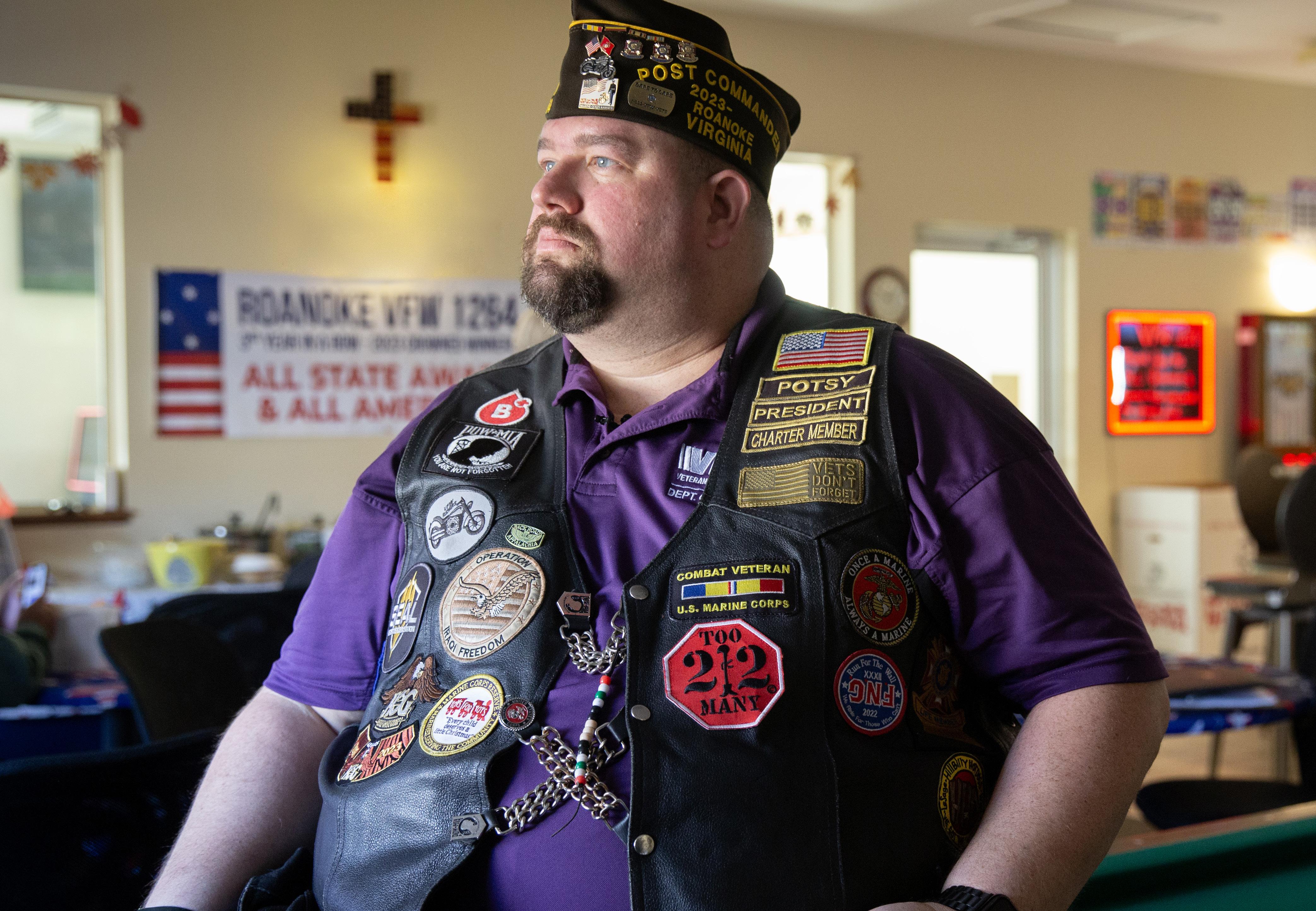
June 14
Juneteenth 2025, A Freedom Celebration at Manchester Dock, 1308 Brander St., 12:30 p.m. to 4:30 p.m., and along the Trail of the Enslaved from 4:30 to 8:30 p.m. Presented by the Elegba Folklore Society, the event features music, dance, community rituals, a youth summit, food, a Freedom Market and a sacred walk along the Trail of the Enslaved. Attendees are encouraged to wear white and may bring ancestral offerings such as flowers, water or fruit. Free. elegbafolklore.org
June 18
Still, We Rise! Juneteenth 2025 at Richmond Hill Chapel, 2209 E. Grace St., begins at 6:30 p.m. with a screening and discussion of the documentary “Finding Edna Lewis”, followed by the “Transcending Walls” mural walk at 8:30 p.m. with artist Hamilton Glass.
A new exhibition at the Virginia Museum of History & Culture explores the lives and legacies of free Black Virginians from 1619 to the end of slavery in 1865.
“Un/Bound: Free Black Virginians, 1619–1865” opens June 14 and will run alongside the museum’s multiyear exhibitions tied to America’s 250th anniversary. It is one of the first exhibitions of its kind to focus exclusively on the stories of free Black individuals in Virginia before emancipation.
The exhibition was developed in partnership with scholars and five Virginia colleges and universities — Norfolk State University, Virginia State University, William & Mary,
Longwood University and Richard Bland College. It includes documents, artifacts and photographs that illustrate the lived experiences, accomplishments and challenges faced by free Black Virginians.
Among those featured is Emanuel Driggus, who purchased his freedom and built wealth in the late 1600s, prior to the legal codification of racial slavery. Another is Joseph Jenkins Roberts, a Virginia-born man who emigrated with his family to Liberia in 1829 and later became the new nation’s first president.
Contemporary descendants of those profiled in the exhibition also contributed to its development. Evelyn Madden loaned items tied to her family’s history, and Jamaican-born

Free. richmondhillva.org
June 19
City of Richmond Jubilation in June Celebration at the Intermediate Terminal, 3101 Wharf St., beginning at 5 p.m. Features music, vendors, food trucks and fireworks. Headlining performance by R&B singer Carl Thomas. Free. rva.gov
Juneteenth Community Celebration at the Branch Museum of Architecture and Design, at 6 p.m. Two new exhibitions open: (re)Framing Protest (Now) and
photographer Ruddy Roye created portraits of several descendants, including Karen Hughes White and Angela Davidson of the Afro-American Historical Association of Fauquier County; photojournalist and historian Brian Palmer; and former NFL player Torrey Smith, a descendant of one of more than 500 people freed by Robert Carter III.
“‘Un/Bound’ offers a comprehensive treatment of the rich, complicated history of a group of people we don’t collectively know much about,” said Elizabeth Klaczynski, the museum’s associate curator of exhibitions.
“People like Benjamin Short, a free Black man who, in 1820, signed a $200 bond with his name instead of an X — a remarkable feat for someone

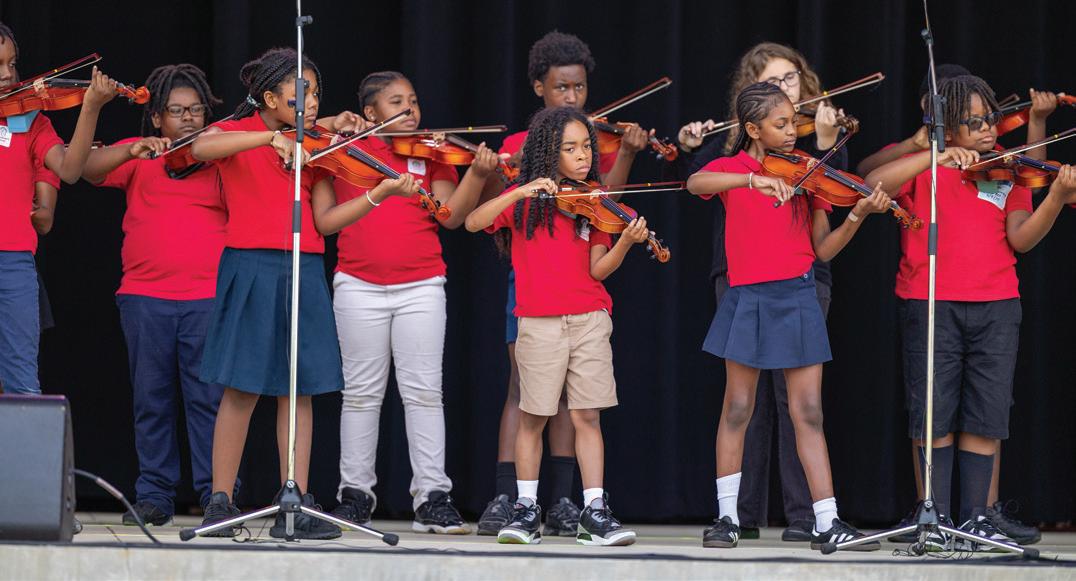
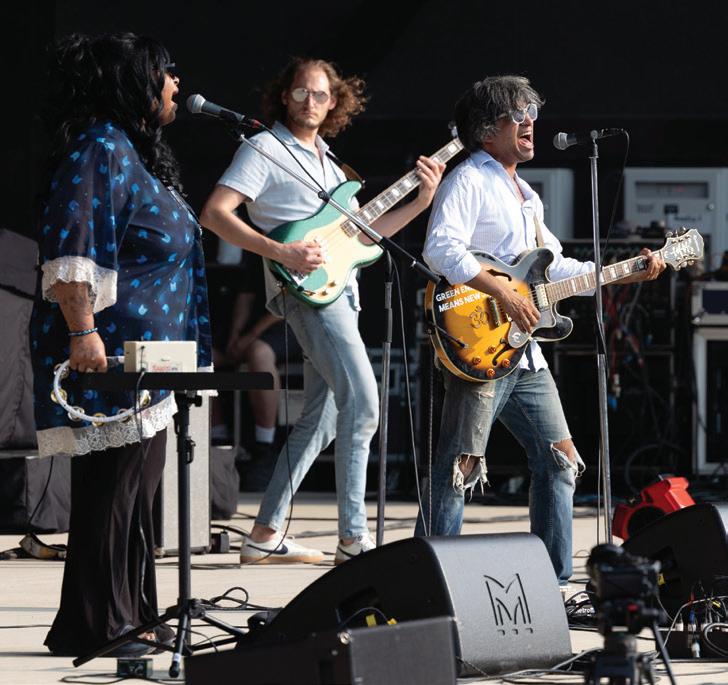
The St. Andrew’s School Advanced Music Ensemble open the new Alliance Amphitheater with the first official performance Wednesday. Richmond Mayor Danny Avula, city leaders and Live Nation representatives welcomed guests at a morning ceremony. The celebration continued into the evening with Sunset Soundcheck, a free concert featuring local favorites Prabir Trio, Deau Eyes and Andy Thomas.



Echoes of Us. Features a live DJ, book signing, pop-up print shop and Richmond Public Library’s Memory Lab capturing personal stories. Open bar and light snacks provided. Free. branchmuseum.org
June 21
Henrico County Juneteenth Celebration at Dorey Park, 2999 Darbytown Road, from 4 to 10 p.m. Family-friendly event includes over 160 vendors, a kids zone, Go-Go music by EU featuring Sugar Bear and the Chuck Brown Band, and fireworks at 9:45 p.m. Free. henrico.us/parks
June 22
Joy on Juneteenth at Diversity Richmond, 1407 Sherwood Ave. — an all-day celebration of wellness, creativity and Black joy, from noon to 9 p.m. Includes line dancing, poetry, music and more than 25 Black-owned vendors, including farmers and artisans. Free. diversityrichmond.org
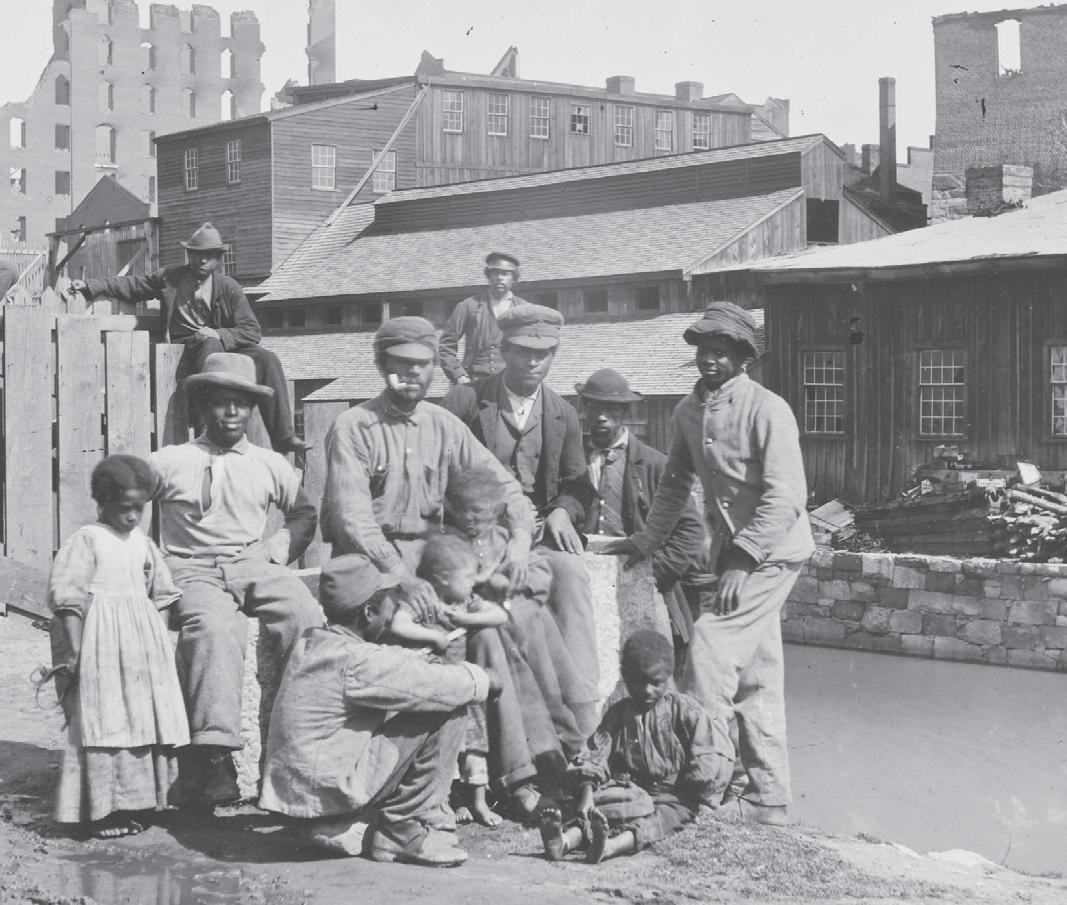
who was born enslaved and most likely did not know how to read or write before gaining his freedom.”
Artifacts on display include state records, letters and family heirlooms. A petition from Matthew Ashby, a free Black man, details his appeal to the Governor’s Council to emancipate his wife and children. A sampler stitched by Sarah Jackson while attending school in Maryland in 1860 reflects how many free Black students had to leave Virginia to access an education.
The exhibition also highlights the Madden family’s history in Culpeper County,
where matriarch Sarah Madden became a successful seamstress and laundress after completing her indenture in 1789. Her son, Willis Madden, operated Madden’s Tavern and owned farmland before the Civil War.
Happy
Day Frank Sharpe, Sr. Gone, but not forgotten!
Items from the family’s past, including a teaching contract and school register, are on display.
A companion publication, also titled “Un/Bound,” features essays by Melvin Ely, Cassandra Newby-Alexander, Stephen Rockenbach, Sabrina Watson and Evanda Watts-Martinez.
A foreword written by former Virginia education officials James W. Dyke Jr., Tim Sullivan and Alvin J. Schexnider states: “For decades, scholars like those featured in this publication made great strides in educating readers about enslaved Black Virginians. The centrality of slavery to Virginia’s history is obvious, but it is not the whole story … ‘Un/Bound’—both the book and the exhibition—fills a critical gap in the public’s understanding of these courageous and captivating people.”
A traveling version of the exhibition will begin touring Virginia in October.


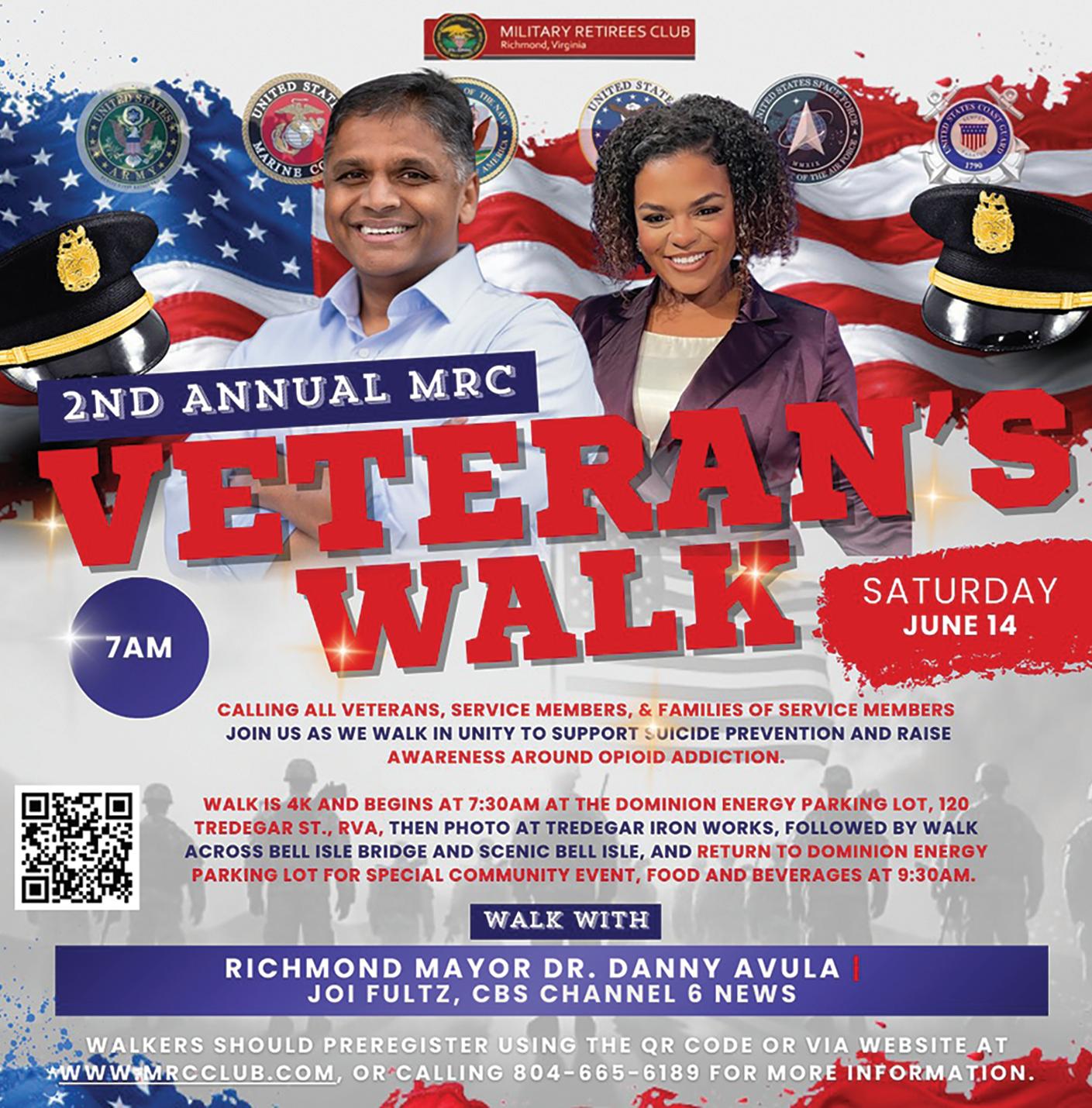




3
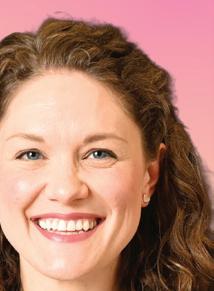













































By George Copeland Jr.
For more than four decades, Lucille Brown shaped Richmond education, guiding the development of students and schools across generations while rising through the ranks to become one of the city’s most influential educators. Her death on June 5, at the age of 96 was preceded by a life whose impact will be felt by the community for decades to come.
“Thank you, Dr. Brown, for paving the way,” the Lucille M. Brown Middle School Community wrote in a statement. “We will continue to walk the path you laid, with pride, with purpose, and with Panther strength. Rest in power.”
Brown’s connection to Richmond education began early when she graduated from Armstrong High School. She went on to earn a bachelor’s degree in science from Virginia Union University and a master’s degree in zoology from Howard University, later continuing her studies at multiple state colleges.
Brown’s college experience led to one of her earliest leadership roles as superintendent in residence at the College of William and Mary.
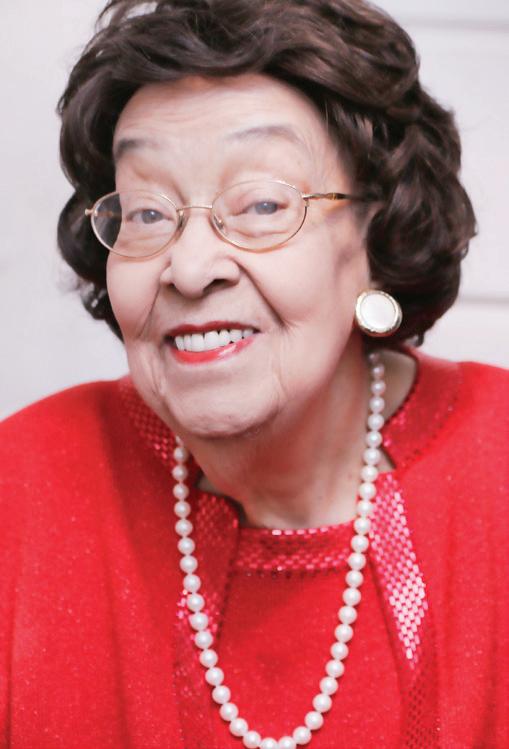
Lucille Brown
After teaching for three years in Fairfax, Brown returned to Richmond as a biology teacher at Armstrong High. In 1974, she began her decadeslong rise through Richmond Public Schools leadership by becoming Armstrong High School’s principal.
“Armstrong High School is proud to have had Dr. Lucille Murray Brown as a student, a teacher, and later, its principal,” Armstrong High School Principal Kelly Carter said. “No matter what position she held, she never lost touch with Armstrong High School, carrying its spirit with her throughout her distinguished career.”
Brown continued climbing the RPS hierarchy, serving as assistant superintendent for secondary education in 1985 and
By Hillel Italie The Associated Press
Sly Stone, the revolutionary musician and dynamic showman whose Sly and the Family Stone transformed popular music in the 1960s and ’70s and beyond with hits such as “Everyday People,” “Stand!” and “Family Affair,” died Monday at age 82.
Stone, born Sylvester Stewart, had been in poor health in recent years. His publicist Carleen Donovan said Stone died in Los Angeles surrounded by family after contending with chronic obstructive pulmonary disease and other ailments.
Founded in 1966-67, Sly and the Family Stone was the first major group to include Black and white men and women and embodied a time when anything seemed possible — riots and assassinations, communes and love-ins. The singers screeched, chanted, crooned and hollered. The music was a blowout of frantic horns, rapid-fire guitar and locomotive rhythms, a melting pot of jazz, psychedelic rock, doo-wop, soul and the early grooves of funk.
Sly’s time on top was brief, roughly from 1968-1971, but profound. No band better
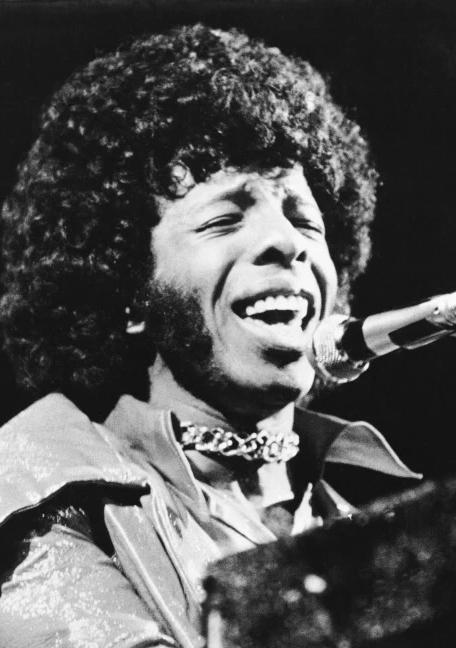
captured the gravity-defying euphoria of the Woodstock era or more bravely addressed the crash which followed. From early songs as rousing as their titles — “I Want To Take You Higher,” “Stand!” — to the sober aftermath of “Family Affair” and “Runnin’ Away,” Sly and the Family Stone spoke for a generation whether or not it liked what they had to say. Stone’s group began as a Bay Area sextet featuring Sly on keyboards, Larry Graham on bass; Sly’s brother Freddie on guitar; sister Rose on vocals; Cynthia Robinson and Jerry Martini on horns; and Greg Errico on drums. They debuted with the album “A Whole
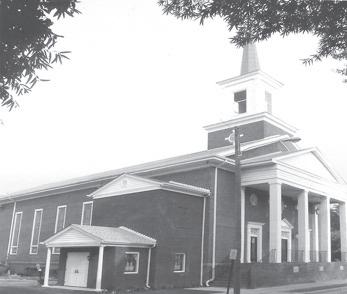
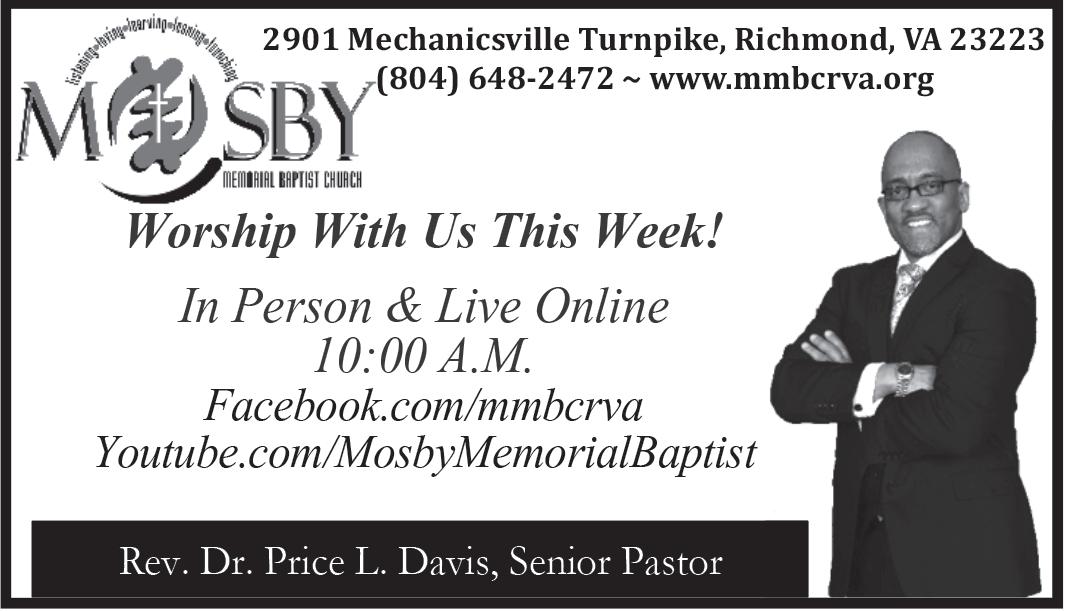
(Dec. 19, 1938 - Dec. 9, 2006) Joseph Jenkins, III. • Jason K. Jenkins • Maxine T. Jenkins k k
New Thing” and earned the title with their breakthrough single, “Dance to the Music.”
Led by Sly Stone, with his leather jumpsuits and goggle shades, mile-wide grin and mile-high Afro, the band dazzled in 1969 at the Woodstock festival and set a new pace on the radio. “Everyday People,” “I Wanna Take You Higher” and other songs were anthems of community, nonconformity and a brash and hopeful spirit, built around such catchphrases as “different strokes for different folks.”
The group released five top 10 singles, three of them hitting No. 1, and three million-selling albums: “Stand!”, “There’s a Riot Goin’ On” and “Greatest Hits.”
Countless performers wanted to look and sound like Sly and the Family Stone. The Jackson Five’s breakthrough hit, “I Want You Back,” and the Temptations’ “I Can’t Get Next to You” were among the many songs from the late 1960s that mimicked Sly’s vocal and instrumental arrangements. Miles Davis’ blend of jazz, rock and funk, “Bitches Brew,” was inspired in part by Sly, while fellow jazz artist Herbie Hancock named a song after him.

“He had a way of talking, moving from playful to earnest at will. He had a look, belts, hats and jewelry,” Questlove wrote in the foreword to Stone’s memoir, “Thank You (Falettinme Be Mice Elf Agin),” published through Questlove’s imprint in 2023. Sly’s influence has endured for decades. George Clinton, Parliament-Funkadelic’s creator, was a Stone disciple. Prince, Rick James and the Black Eyed Peas were among performers shaped in part by Sly.
“Sly did so many things so well that he turned my head all the way around,” Clinton wrote. “He could create polished R&B that sounded like it came from an act that had gigged at clubs for years, and then in the next breath he could be as psychedelic as the heaviest rock band.”
Sly Stone had three children, including a daughter with Cynthia Robinson, and was married once — briefly and very publicly. In 1974, he and actor Kathy Silva wed on stage at Madison Square Garden, an event that inspired an 11,000-word story in The New Yorker. They soon divorced.
Sunday, June 15 Morning Worship 11 a.m.
Theme: “A Father is Blessed Through His Family” Speaker: Rev. Deacon Marlin Osborne Scripture: Genesis 18:17-19 NIV

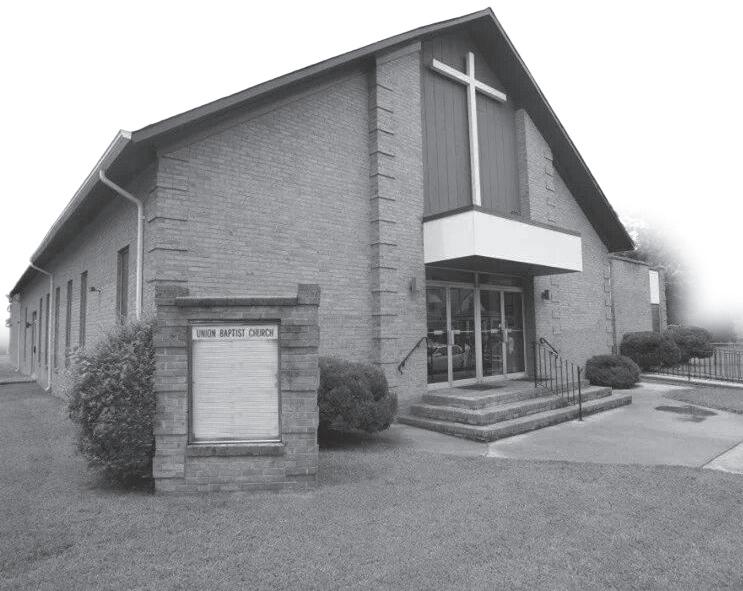
assistant superintendent for instruction in 1989. In 1991 she became the second African American woman to serve as RPS superintendent, following Lois Harrison-Jones’ groundbreaking tenure. Her career with RPS spanned 38 years.
Outside education, Brown served as a member of the Black History Museum and Cultural Center, the Virginia Union University Board of Trustees and the Board of the Heroes Foundation. She was also a member of the Alpha Kappa Alpha Sorority, Inc., the James River Valley Chapter of The Links and the Board of Directors for the Educational Advancement Foundation.
“I’ve always been interested in service to others,” Brown said during a 2021 interview for Virginia Union University’s educator series, “so my life has also had quite a voluntary aspect to it.”
A viewing will be held Saturday, June 14 from noon to 5 p.m. in Scott’s Funeral Home at 115 E. Brookland Park Blvd., followed by public viewing from 5 to 6 p.m. and ceremonies from 6 to 8 p.m. in the Allix B. James Chapel
